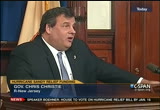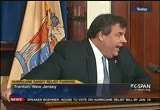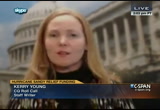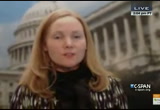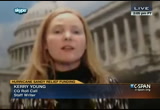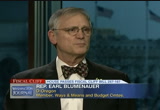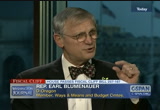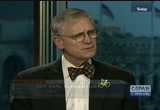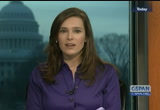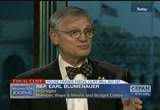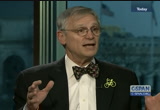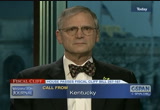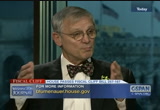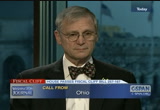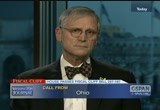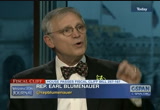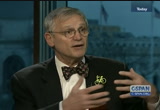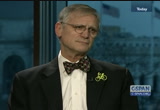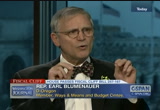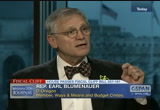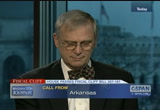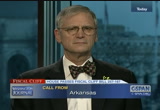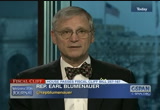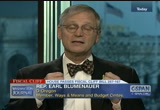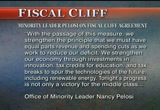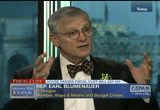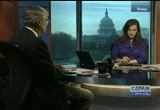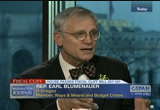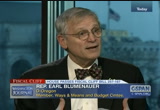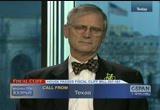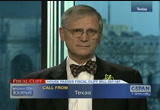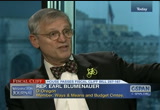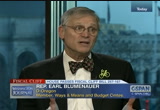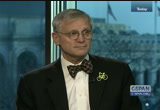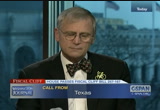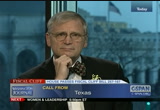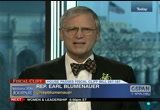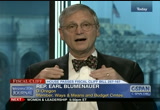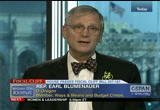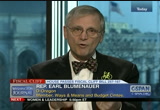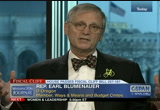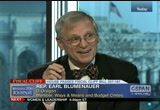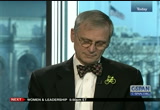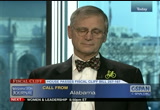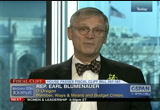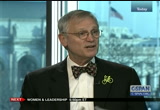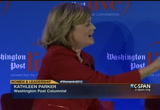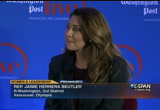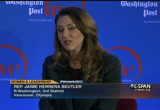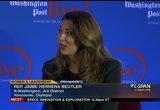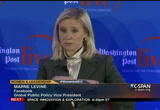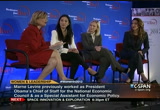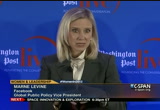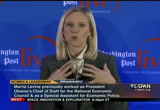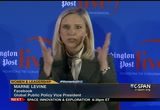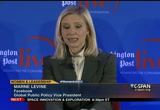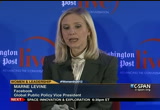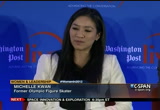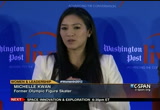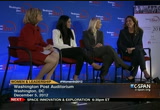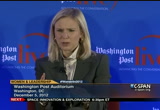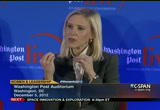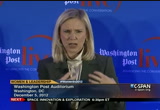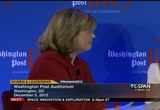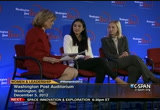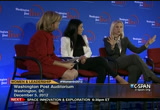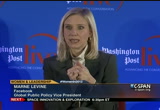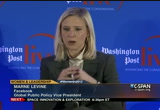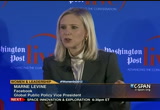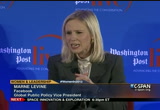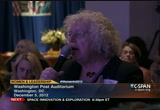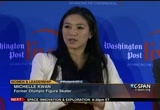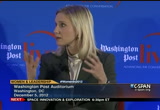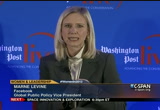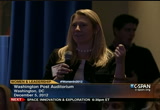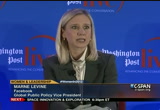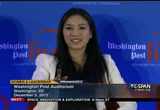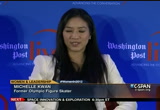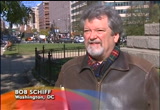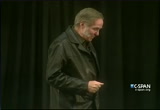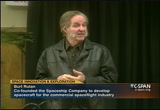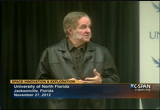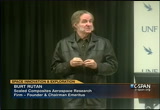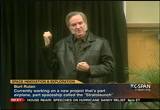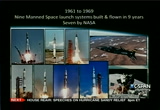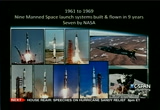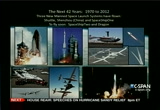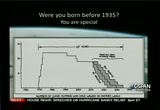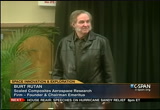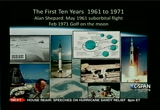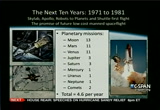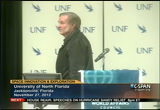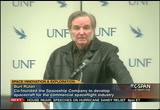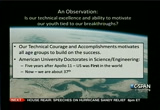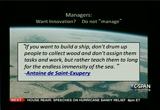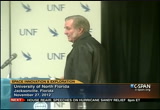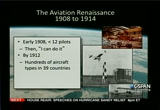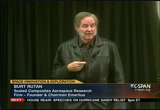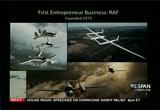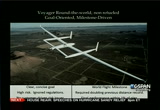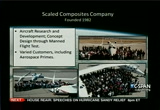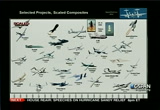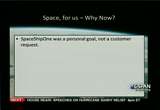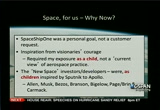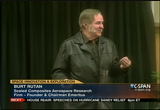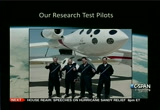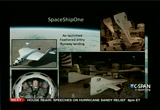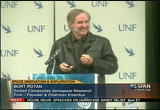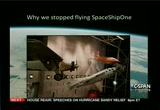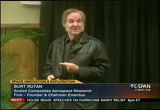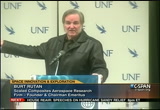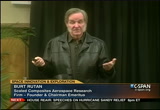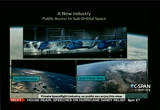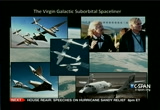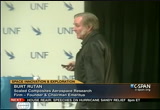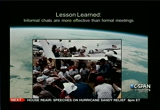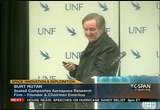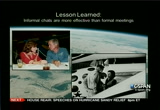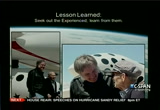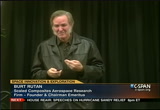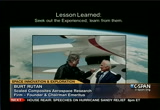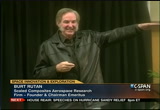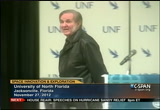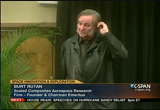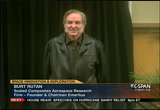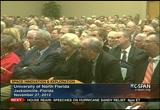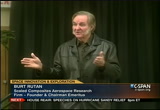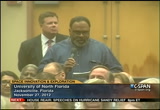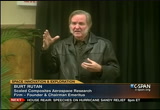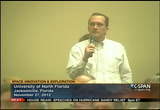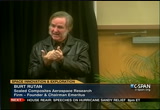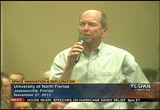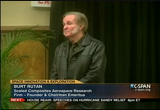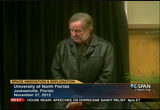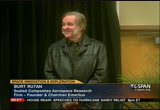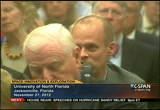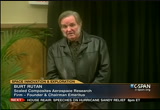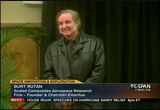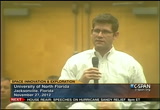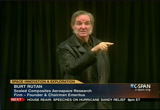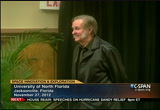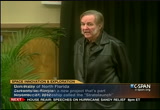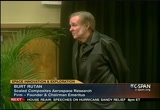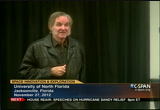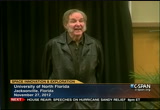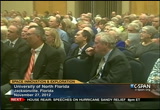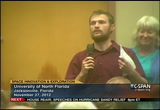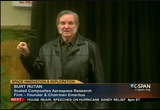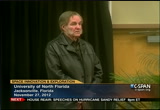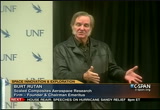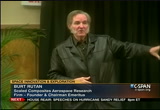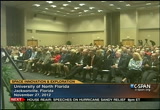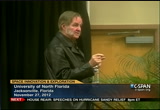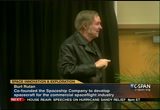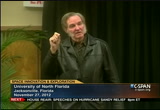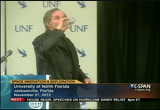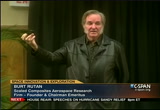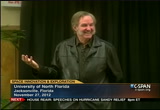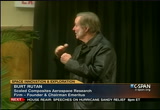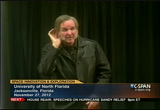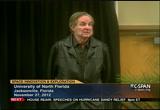tv Public Affairs CSPAN January 2, 2013 5:00pm-8:00pm EST
5:00 pm
someone characterizes, probably the last time they are going to talk to me. if i do my job the right way, i have to be smart about this. charlie? [inaudible question [inaudible]] >> sure, vote no. vote no. majority rules. if they want to vote no, vote no. i'm not saying someone has to vote our way, i think they should, but i'm not saying they have to. what happened yesterday, it wasn't even allowed to happen. if you're down there playing games, not moving things along, not making decisions, yes or no, you're not doing your job. when you sit around and delay and give assurances to people
5:01 pm
that it will be done and it's not done, that's not doing your job. put it up, vote yes or new york move on. this is like the people we have down the hall with the senate democrats who don't want to have up or down votes on supreme court justices, prosecutors, all these other people because what they know is they don't have any substantive reason to oppose those people. the same way most of these folks didn't have any substantive way to oppose this. that's the problem. >> nauble -- [inaudible] >> absolutely support the leader ship. i don't believe that's what the report said. i mean, i think you've guilded that report up pretty well in the leadup to your question. i don't think that's what the report said. i think these guys made the
5:02 pm
best decisions they could in the circumstances. once you see the yard is flooded, you can say, they would have move -- they should've moved the trains. if they had known it was going to flood, they would've moved the trains. he made the best decisions he could at the time. sometimes people make wrong decisions. it happens. it's not a hanging offense. questions? all right. >> speaker boehner met with representatives from the area,
5:03 pm
he said hurricane sandy relief needs to be an important -- an urgent program. >> the most obvious problem is the flood program, it will be in trouble if they don't get money by friday. they'll pick up the rest of the package sometime january 15. >> why didn't they schedule a vote before the end of the 112th congress? >> it's a great question. it sounds like they thought they would have a hard time getting through the fiscal cliff, that that would be enough to ask your members -- their members to do and qupted -- expected to go this yesterday. it was odd to see a bill come out and wait for hours, there's a lot going on behind the scenes. >> you say there's a lot going forward, can you elaborate? >> the most dire need is addressing the flood program. they will give that the money,
5:04 pm
it sounds like they'll give maybe around the request money president obama has requested this esame money in the senate bill, the same money we saw in chairman rodgers slimmed down, peared down, narrow initial response bill. that $9 billion that the fema flood program needs. they'll come become on the 15th, the new york and new jersey delegation has worked hard on this, it will be on the form then. it might look something like the two-part amendments, the two-part bill we saw chairman rodgers propose yesterday with about $27 billion in the first traunch, or less with the flood money out, $16 billion, 17, 18 billion in the first traumpling and a larger bill with long-term recovery money. >> the senate has already passed a disaster relief bill. will congress have to start the process all over again in the 113th congress? >> the bill that the senate passed dies tomorrow. the house is only in for about
5:05 pm
an hour and that sounds just like a formality. so that bill will expire, all the work done on it, it won't be lost, we know what the senate will pass and they should be able to move quickly on this once the house as i understand the bill back over. that's the traditional route for the spending bill, it would have been more unusual to have the senate start. >> why is getting this bill done so important for the lawmakers who are pushing for it? >> it's not a good practice to leave fema to run dry. they have about $4 billion left, which sounds like a lot of money but they need to start conserving that money soon if they don't get extra money for the fund. they'll have to tell people applying for new applications that they may have to hold off on congress. congress has done this repeatedly, five or six times in the past decade they go to immediate needs funding. it's disruptive. it's better to manage this ahead of time and give fema the
5:06 pm
money it needs. then go back. there'll be debate about the longer term recory project the transit programs but the fema money there seems to be broad bipartisan support that these are the two pieces you need to get young. >> kerry young is a staff writer for "c.q. roll call," appreciate your time. >> thank you. >> i primarily watch the house and senate, i used to work in the senate, i tend to flip over there especially if there's something going on, coverage on the floor on the networks, you won't see that. c-span has it. c-span is where you can find something important that's not otherwise covered. i even listen to c-span radio in my car sometimes. >> bob schiff watches c-spanned on direct tv. c-span, created by america's cable company miss 1979. brought to you as public service by your television provider. the 112th congress plans to meet one last time tomorrow morning at 11:00 eastern.
5:07 pm
no votes are currently expected and then an hour later at noon eastern, 113th session of congress begins. we'll have live coverage here on c-span and of the senate on c-span2. the opening day will include the roll call of members, the election of the house speaker. again that will be live here on c-span. democratic congressman earl blumenauer of oregon is returning for the 113th congress. he was in this morning -- he was on this morning's "washington journal" talking about the fiscal cliff vote last night. host: you voted against the bill that passed last night on the fiscal cliff, why? >> for me -- guest: for me it represented a lost opportunity. we're in a situation where most people recognize that policies are not sustainable. we have a growing and aging population.
5:08 pm
we need to not only raise more revenue but we have to change how we do business and having the circumstances around the cliff with the expiring provisions work the sequestration, with the con crufingse the congress, was an opportunity to do something more substantial. and instead, all we did was kick this down the road, an overused term but that's what we did. we didn't address the debt ceiling, which should have been part of any major agreement, we're going to be in the middle of that for the next two months, and we have taken a situation where the american public are focused on the big picture and the president had leverage and we settled for a third of a loaf, a quarter of a loaf, we didn't really change how we do business and we institutionalized this political hostage taking for the new congress that starts tomorrow.
5:09 pm
host: from our twetter feed: guest: i think that's a fair approximate mation. we have three cliffs that are facing us. the government operations run out in march. we've already gone over the cliff as far as the debt ceiling is concerned. and you can horse around a little bit, you can use a little bit of slight of hand but the clock is ticking. we're going to have to address it. and then the sequestration, which is postponed for two months. it's going to be a troubling time and there's some real changes in my republican colleagues coming forward that doesn't augur well for a smooth transition in the house. host: you see the debate that will happen in march on the fiscal cliff and sequestration as a new opportunity, to do some of the heavy lifting you wish had gotten done?
5:10 pm
>> yes. it's not going to be as effective, as i say, because we've had a congress that has gone through, that has stubbed its toe, bloodied its nose, maybe a few people learned something. we also had a large number of people who were leving that might be able to not be looking over their shoulder about being lugarred in a primary. in fact 20% of the republicans who voted yes on the proposal last night are leaving congress. host: if you'd like to join the conversation and talk with congressman blumenauer, democrat of oregon, here are our numbers. let's look at the details of the fiscal cliff legislation that passed the house yesterday. it extends the bush era tax cuts up to $400,000 for individuals and $450,000 for
5:11 pm
couples. taxes go up for those who make bo those thresholds. the social security tax, the payroll tax holiday ends, so that goes up by two percentage points. unemployment benefits were extended. the alternative minimum tax was adjousted -- adjusted and the doc fix to not see a 27% cut in medicare reimbursement. do you agree with those items? >> all of them needed to be addressed. but look at the details. for example, the doc fix is absolute lunacy. it's something that nobody wants to have 27% reduction in medicare payments, but instead of addressing it straight on, and it's something we fix every year, unless there's a complete collapse in the legislative process, we're going to torment medicare prviders for another year who are apprehensive. there is a permanent patch for
5:12 pm
the alternative minimum tax but this is a tax that needs to be fundamentally reformed or repealed. and remember, the scoring mavens decided it didn't cost us anything to make the patch permanent because we're going to do it every year. why in heaven's name shouldn't we take this complex, unfair, tax and eliminate it altogether. so it's part of these details that institutionalizes the arm wrestling and the horse trading. and now over the course of the next few days, we're going to find out a whole bunch of other things that got stuffed in there by staff of various senate offices that joe biden and mitch mcconnel never talked about. do you really think they got into the details about how we were going to treat rum excise taxes for the vir-in islands
5:13 pm
and puerto rico or expensing certain movie and entertainment costs? i think not. host: let's hear it from lexington, kentucky, from our democrats' line. caller: i had just a couple of quick thoughts that were a little more foundational. one of them had to do with, there's a sense that there was a mandate on the part of the republicans to be able to continue to push what they did in the house. i wanted your thoughts on it. but one of them has to do with, i don't think the american public understands how congressional districts are apportioned and how they are -- i hate to use -- host: i think we lost john. guest: we lost john but i think he was going to use the term gerrymandered. and that is a significant
5:14 pm
factor. for years i have advocated an independent, nonpartisan redistricting commission, we could actually establish that on the federal level. there are states now that are making it, taking it out of the hands of the politicians to pick their voters and instead let the voters pick the politicians. this has been going on for years in iowa, my friend, former colleague, jim leach and i had written about that, it's happening in california, in arizona, even a little bit in florida. that is part of the problem because democrats nationally got more than a million more votes than republicans who ran for the house of representatives. yet they come into this with a 35-vote margin. and there are some areas where, in north carolina, there were more votes for democrats than
5:15 pm
republicans, but there are only 20 -- -- but only 27% of the representatives are democrats. that is part of the problem. it confuses this notion about mandate. after all the president won decisively, the senate actually picked up ground, and we had a million more votes nationwide for the house of representatives. that doesn't sound like much of a national mandate to continue the policies of they have republicans over the last decade or so. host: let's go to our next caller, david, ohio, republican. caller: good morning. being a regular person on a budget, i can only get the things that i can pay for. i would love to be able to buy my children, you know, ferraris or new houses or all kinds of
5:16 pm
things that they would love to have but due to my budget, i'm unable to do that. the president kept on saying he wanted a balanced attack to this problem, which i agree, you have to increase revenue but you've also got to address the spending. i mean, when you don't have the money to do the things that you guys want to, you got to start to cut back. $1 for every spending cut, you got $41 worth of revenue. if i did that in my house, using a credit card to get by for a while, eventually the bills are going to come due. my question to you guys is, when are we going to use common sense and say, we cannot afford this anymore. >> i agree and disagree with david. first of all, there are lots of
5:17 pm
things we can do to reduce spending and ironically, i think there are republicans and democrats who would agree. do we need to have three separate delivery systems for nuclear weapons that we have never used, won't use, don't need and are going to cost hundreds of billions of dollars? i think that we could end welfare for large agribusiness, provide more support for farmers and ranchers who are, the family operations, thee are things that, where there -- these are things where there is support. i've been frustrated as a member of the budget committee that we have this ideological debate and not concentrate on areas we know we could reduce spending and improve service. do we need to spend more on security, c.i.a.,
5:18 pm
establishment, we spend more on that than russia spends on its entire military budget. four million people with security clearance? it's a series of bureaucracies that's out of control. we can and should focus on those things. but one area where david is wrong and the government is different than a family is well things, maybe in a sense it's the same. if david's family ended up in a terrific situation where there was a catastrophic illness or his children were unemployed and they were facing eviction, i think david actually would use a credit card to stop the kids from being on the street or to make sure that people get the health care they need if they are uninsured, that's what the government has done here. unemployment insurance, sure, borrow for it, for heaven's sakes, this helps stimulate the economy and it helps keep people in their homes and it's
5:19 pm
what we do in tough times. now the key is going forward restoring balance and doing things that republicans and democrats can agree on. i hope we can move in that direction. 135,000 u.s. soldiers overseas, over 1,000 bases. surely we can come together and recuse those expenditures. the speaker pro tempore: here's a tweet that congressman blumenauer put out before returning to washington a few days ago he wrote he was traveling back to d.c. where a poor stop-gap plan is worse than the cliff which would force the tax and program reform america needs. you can share your tweets with the washington journal by writing @c spanwj. here's thoughts from tom.
5:20 pm
guest: it was the price the republicans extracted to not wreck the global economy to pay for spending that congress has already approved and in many cases done. those were republican dominated congresses, by the way, fighting a war for the first time in -- two wars depr the -- for the first time in history without paying for them. the sequestration was a series of automatic cuts that was going to occur if we couldn't reach the grand bargain. this has been as i mentioned earlier, delayed two months but it's still looming over us. the notion of whether or not we're going to have smaller government, people ought to go and look at what actually happens. because we have already committed to over $1 trillion in spending reductions. if you look at what's happening in agencies from the park
5:21 pm
service to veterans affairs, these are going to have serious consequences already and the notion somehow if we're not adjusting the rate of increase is not a cut is lunacy. you talk to senior citizens, the average social security recipient gets $14,400 a year. if inflation is a percent or two or three a year an that's not adjusted, you think that's not a cut? it absolutely is a cut in their standard of living and their ability to maintain their home and health. we're getting a smaller government, what has happened over the last 40 years is that republicans have decided to borrow and spend instead of tax and spend and we have exceeded revenues 2.7% a year. this is a small step toward
5:22 pm
moving with balance, it's not enough, and bush duh we just -- but we just need to change how we do business, points i made earlier in our conversation. host: congressman blumenauer sits on the ways and means and budget committee, he's in his ninth term representing the -- representing his district in oregon that includes portland. and he's been re-elected. let's go to paul in greenwood, arkansas, independent. hi, paul. caller: i was wondering what happened to the 3-1 ratio of spending cuts to revenue increases, didn't happen. we've got the biggest military in the world, top 13 countries in the world, we have -- we spend more on defense than those people do and we've got people all over the world don't
5:23 pm
need to be -- we're not an american empire, we're not the world's polices for. we could pull some of those people home and bring them to those bases and be spending money at home instead of overseas and as far as medicare goes, it's easily fixed. let me repeat. it's easily fixed. do you know how? invite more people to buy into medicare at younger ages, say 50 and above. they can't afford private insurance, $600 a month, bring them in at $200 or $300 a month and shore up medicare and that expense would be gone. we're paying contractors in the military three times to 10 times what we could train a g.i. to do. that's war troft tiering and that's what we're -- profiteering and that's what we're into in these wars. host: paul, we'll get your comments to congressman blumenauer but what duke about
5:24 pm
the fiscal cliff? caller: we should have gone over the cliff except the bottom margin or two. host: all right, let's go to the congressman. guest: i think paul makes important points. there are, without question, opportunities for us to readjust military spending. we spend almost half of the world's military budget and a bunch of those other countries are allies of ours, canada, great britain, france, germany. we don't need to have the most expensive military in the world by far, we could scale it down a little bit, we would still be the most powerful nation on earth but we would not have an unsustainable spending pattern. in terms of medicare, there are opportunities to adjust that spending going forward. i come from a state, oregon, where we have made an agreement
5:25 pm
with the federal government in exchange for a little bit of flexibility in administering the medicare program and getting a tiny bit of advanced funding we are going to save the federal government billions of dollars over the next 10 years. in fact, governor john kitsaber has developed a program that if it were applied for medicare programs around the country to pay for value instead of volume, try and deal with the whole patient, accelerate some of the reforms that we had in the affordable care act, it would save over $1 trillion for the federal government over the next 10 years. we don't need to have the most expensive and least efficient health care system of the major countries. and we can do it by taking principles being applied now in some states and are part of the health care reform.
5:26 pm
this is within our capacity and what we should have been focusing on. the speaker pro tempore: "the washington times" has this headline, obut ma displeases both side. you earned a spot in this piece, it says the oregon congressman said it's incomprehensible that spending cuts will be on the table again in two months. let's see what nancy pelosi said about the bill. this is a statement her office put out.
5:27 pm
host: yet you voted against it. guest: i have a great deal of respect for what speaker pelosi didened she fought for a number of principles that wouldn't have been there if not for her focus and the democratic caucus. there are a number of provisions in there that i care deeply about. i've been the leading upon sor of extending renewable energy, for example. but what i guess is missing here in this equation is being able to actually implement the reform. i think the work that leader pelosi did, if it were focused on the bigger picture, if the administration made clear, for instance, that we were not going to have a deal unless we dealt with the debt limit, which has already been exceeded, i think there was an opportunity for us to get out of the squirrel cage that has trapped us for the last two
5:28 pm
years. i have huge respect for her efforts. it would not have passed the house were it not. she is a valuable ally and i think advisor to the president. i just think that this was an opportunity for us to go bigger and i hope that we don't miss an opportunity going forward to change how we do business. much of what we're arguing about here if we cut away the clutter and focus on how to improve government efficiency and tax fairness, is supported by the majority of the people and could find bipartisan support in congress, i think. >> one report states that big winners are biodiesel and other alternative energy, and it
5:29 pm
would care part of the obut ma health care law designed to allow millions of elderly and disabled get help at home. host: it sounds like you agree with some of the things in here but disagree with others. guest: yeah. and make no mistake, the work that was done enshrined some positive items and helped with the transition of unemployment insurance, the clean energy, as i said we're going to find things that were buried in it. it's no substitute for our taking a creeky, inefficient, unfair tax system and trying to broaden and make it more fair, get rid of the alternative minimum tax, get rid of this bizarre doc fix ritual go go -- we go through every year. this was the time to force those issues. and i fear that it's going to
5:30 pm
be harder in the new congress. guest: it's interesting, our tea party friends came to congress vowing that everybody would have 72 hours to read the bills. i didn't say anything about it on the floor last night but it's ironic. not one of them had read that bill. not one. there are some circumstances where there's a lot of boilerplate and complexity where that's not the best use of your time, but doing this at the last minute, jamming it through, and stepping on the promise that swept them to office, i actually read the affordable care act but now they're all of a sudden finding out it's a different reality and they completely surrendered on this point which was something that they care deeply
5:31 pm
about and used for campaign purposes to get into congress and they violated as they left congress. host: from longview, texas, a democrat. caller: good morning, ma'am, how are you doing? how are you doing, congressman? i've got a lot of things to say and a short time to say it. congress had all this time to get this bill passed osm because ma put a lot of bills on the table, boehner, cantor and mcconnel went through and they wouldn't let nothing pass in the house. if you look at the situation, i just lost my job at christmas, i'm getting ready to take care of my business but you've got people on the tv talking about obama, this is the most
5:32 pm
reasonable president we've had in office besides bill clinton. there's a reason we put him back in office. he's for the people, right. the other man that run for president, think about where we'd be, he only cared about the rich. my point is this, man. they got a lot of bills going on in congress. people taking tax money, going on a big vacation. take all these vacations, taking this money, spending this money. you try all the people on the tv, talking about can't do that, ok, we got these people in congress right now, this president, you understand me, he is trying to do everything he can. his hands are still tied. host: it sounds like you are
5:33 pm
are a defender of president obecause mark drawing a comparison between president obama and mitt romney, his opponent in the presidential election. does president obama have a mandate? if he says, i want you to vote for this, democrats, that you should vote for it? guest: the president was clear he wanted to maintain the quarter million dollar ceiling. he gave ground on that. but it was as clear a policy statement as possible and mr. romney and mr. ryan posed, i guess, sort of a contrast, although they got fuzzy toward the end when it's kind of hard as mr. romney was reinventing himself but what he said for most of the campaign was diametrically opposed to what the president has proposed here. the american public saw it, the american public decided and as i say, it wasn't just the
5:34 pm
presidential election, but it was overwhelmingly in terms of senate and the house, more than a million americans cast their votes for democrats. there was somewhat of a mandate, i think, in anybody's opinion, which is one of the reasons why it might have been useful if we had seized on this moment for other areas of reform and getting rid of the continuing deloifed debt ceiling. host: headline in the "new york times," on the left, seeing obama give away too much again. the president found himself under withering criticism by some in his base by not taxing the rich more. does the president lose ground? guest: what will happen going forward will determine the degree of support and enthusiasm. i think there are a number of
5:35 pm
people who have listened and the vice president came to our caucus yesterday and made a very aggressive representation about this just being the first step and that things going forward would be balanced. and that the president would be looking for more reform and more efforts in fiscal stability in term os of reducing expenditures and increasing revenues. how we end the fact that he would absolutely under no circumstances debate the debt ceiling limitation and if the president is able to flole through on that perspective, that would relieve a numb of people who were concerned because they saw this agreement as softening things that had been earlier pretty bright lines in part of the campaign. but that's going to be unfortunately, it'll take two
5:36 pm
or three months of hand-to-hand political combat to determine. another area that's deeply concerning to people like me is that there are other things we need to do. we need to reform the immigration system, for instance, and the president is committed to it. it's long overdue. but if we're going to be bogged down for the next two, three, four months with more budget drama like we've had, it's going to be very hard to deal with gun safety, to deal with immigration reform, and a whole range of other things that are still, not just on the backburner, they're on the front burner but maybe simmering a little bit. host: congressman earl blumenauer, democrat of oregon, on the budget and ways and means committees, he represents the portland area. rob is up next a republican call for the bedford, texas.
5:37 pm
caller: my call is in regards to the estate tax. my wife and i own a sub-s corporation here in texas. we planned to retire, have done that, just started on medicare. my monthly cost is twice because of my income, i pay twice what the average is. and then -- and now we're planning to die. i understand that the estate tax is going to go into effect for over $5 million, our estate will have to pay 40%. the senator from illinois yesterday said, well, that's only less than 1%. well, you know, it seems like you guys are playing a percentage game. if it involves less than 2% or less than 1% of the people, let's stick it to those people. let's don't worry about them because they can't carry much of a vote. but we're real people. the other thing i hear a lot said is, well, the middle class are hardworking people.
5:38 pm
i work hard too. i pay my taxes. i enjoy life. i enjoy giving things to organizations and things like that. i don't enjoy giving my tax money and i think it's really a sad commentary for you guys to say, well if you are doing well, then you have to be doing something wrong. you have to be mean, you have to be bad, you have to be sitting at home and not working. i work eight to 12 hours a day. five days a week. and i want to keep what i have and pass it on to my family. but it seems like i'm less than 1% of the -- of the population so i don't really matter. you guys will say, let's stick it to those people. host: let's look at what you laid out for us in terms of estate taxes, taxed at a top rate of 40% with the first $5
5:39 pm
million in value exempted for individual estates, $10 million exempted for family estates. guest: i think that's an important point. first of all, rob, the only people who claim that to folks that are doing well are doing bad are, you know, this is rhetoric from the right wing talk show. there's nobody that i've -- that i know in congress who thinks that. nobody that i know in congress on the floor or in committee ever said anything like that. that's crazy talk. that's crazy talk. i've got lots of friends who are successful and i don't think that somehow the fact that they're successful is something that unpleasant or a character flaw. and the notion that somehow that's the rhetoric, and stick it to them, is just goofy. that's not the case. but to revert to the tax rates
5:40 pm
that we had just a few years ago is somehow sticking it to people i think just is a little bit -- it's not -- that's not the point at all. the idea here is to be table have a balanced program that people in the top 1% have had a very significant increase in after tax income. and having that tax burden increase a little bit not unrealistic at all. the inheritance tax, for $10 million for a family, again, this is a -- most of the estates over $10 million represent appreciated capital. this is an asset that was never taxed once. how much has warren buffett or
5:41 pm
bill gates paid on their billions of dollars? that they are entitled to pass on as they see fit either to charity or friends or other choices. if we didn't have an inheritance tax, most of that would never have been taxed at all. a friend of mine who is an estate planner and tax attorney was part of an advisory committee and pointed out that the limits of the $5 million per american, $10 million per family is just the beginning. there are all sorts of techniques that are used that shield more income from the inheritance tax. but i do agree with paul on one point. one of the things i didn't feel comfortable about with this proposal is the notion that somehow we can pay for everything that america needs as it ages, and as it grows, by
5:42 pm
the top 1.5%. those are the people that are going to pay into this. i think there needs to be a broadening of the base. i think there are going to be more opportunities for us to reform the tax. but if we're going to meet the needs of the future, it's not going to be singling out 1% of the population. there's going to be a broader need for revenue and it needs to be shared more broadly. and i think that's in fact going to happen over the course of the next 10 years and that's what all our international competitors do. we have the most progressive income tax system in the world and we have the highest corporate tax but their base is very narrow. we twheed to -- we need to broaden both, reform it and simplify it. host: let's go to david in minnesota, independent line. hi, david. caller: good morning. thanks for taking my call. my big thing here is of all the
5:43 pm
problems that arise between the democrats and republicans, term limits. term limits, term limits. until the public demands term limits and control lobbyists we're going to have the same old, same old, same old. host: ok. guest: well, that's interesting. look at what's happened in california, which is probably the poster child for term limits with their state legislature. has it reduced the influence of lobbyists? hardly. you have a six-year limit in the california assembly and you have two four-year term limit in the state senate. what you've done is turned that legislature, which after all is a legislature for the seventh largest economy in the world, into a big bus station. people -- nobody is there to really drill down, be an expert, spend the time and be
5:44 pm
able to exert independent influence. what you have done in california is that you have people cycling through, running for other office, and by any objective measure, you've increased the role and the influence of special interest, the bureaucracy, and lobbyists. the work that we do in congress that happens in the california state legislature, actually has some complexity, it deals with balancing a wide variety of interests. it's not particularly easy if you're going to specialize even in one small area. an example, we've heard about the milk cliff that because of the failure to extend the farm bill was going to have a dramatic increase in milk prices that would revert to the
5:45 pm
law of 1949, i would invite any of the viewers to try and understand just that little program and how et works and think that somebody is going to drop in here in a matter of weeks and be able to understand that type of complexity times a thousand. look at term limits in california and people can decide whether that's been a really great reform or not. i'm inclined to think it was not particularly helpful. host: headlining "usa today," the senate farm bill tries -- tries to avoid the dairy cliff. let's go to jennifer on our democrat line. caller: i'm a democrat in a republican state, i'm not very popular down here but i have two points to make and that is, the middle class is the real
5:46 pm
and true job creators. if the 1% and 2% want to understand how to get wealthier, you have to understand that in order to get wealthier you must put more money in the pockets of the middle class. because they can buy the products and services that the wealthy people produce. and that's just the way that it is. so you can imagine, i'm for tax breaks for the middle class. also, -- host: jennifer, would you have voted for this legislation that passed the house? caller: yes, i think that president obama has been extremely reasonable, i think the republican party, they are extremely unreasonable. host: what do you have to say to our guest who voted against it who is a democrat from oregon. caller: i disagree, i believe he's a very thoughtful person, i believe he's a thoughtful man, if he felt it was not reasonable to him, i really
5:47 pm
can't, you know, say anything but the thing of it is, i'm glad that a deal was done because had it not been done, the republican party would have looked a lot worse than what they looked now. host: ok. guest: jennifer's made your point. we're all in this together. we're not going to be able to have the united states rebound its economy to get our footing without efforts to make sure that we boost demand, that we strengthen the incomes of families across the board. it's not an us vs. them in my judgment. we need to be investing in rebuilding and renewing america. we've got infrastructure that's falling apart. we need to make sure that we are investing more in education. kids shouldn't be graduating with $27,000 on arch college
5:48 pm
debt that they can never discharge in bankruptcy no matter the circumstance. we've got an opportunity to strengthen everybody by rebuilding, renewing the country, reforming how we do business. that's why i voted against the deal because i thought we could have done it in a more comprehensive and thoughtful way. >> we have a conversation on our facebook page asking you what you think about the house vote last night. we've gotten hundreds of comments already. a couple have come in, one says pau la loves oregon politicians, and cara wants to know why you're wearing the boeing pin. guest: this is a representation of bike partisanship. i bike to work every day, have for 20 years. it's something republicans an democrats can agree on, burning calories instead of fossil
5:49 pm
fuels, not adding to congestion , people are in a better mood when they bike to work. >> on tomorrow morning's "washington journal" we look at the 113th congress with bob cusack, of "the hill." and we'll talk to new members of the congress, including pete gallego, texas. representative elect tom cotton, and arizona's new republican senator, jeff flake, moving from the house. "washington journal" is live tomorrow morning at 7:00 eastern here on c-span. and the 112th congress plans to meet one last time tomorrow morning at 11:00 eastern. no votes are scheduled. an hour later at noon eastern,
5:50 pm
113th session of congress begins with live coverage here on c-span and the senate on c-span2. we'll have the opening day including the roll call of members, as well as the election of the house speaker, all here on c-span. former olympic figure skater michelle quan and washington congresswoman jamie beutler participated in discussions on women & leadership. michelle quan talks about how she uses skills she learned as an athlete in her transition out of sports. congresswoman beutler talks about her being a woman in congress. this is 50 minutes. >> welcome back. i want to introduce our next amazing panel. i want to start with jamie herrera beutler. she represents the southwest washington state, washington's third district.
5:51 pm
she just turned 34 and she is the youngest woman currently serving in congress. welcome, jamie. next to her is marni levine, former chief of staff at the white house national economic council. she's the former chief of staff for larry somers when he was at harvard university and she's currently the vice president of global public policy for this company you may have heard of called facebook. welcome. and next to me is michelle quan, she's simply the most decorated figure skater in u.s. history. we remember watching you at the olympics and we i mean, i can still remember some of those routines, she also has another cool job now, she's senior advisor in public policy at the u.s. department of state. what a group we have here. i guess i just want to start
5:52 pm
out and talk about how do you do it? how do you rise to the top? what are the hard parts? >> you know, i don't know if i'd say i'm at the top just yet. we're waiting for that, whether it's -- i'm looking at maybe someone in the audience, maybe someone watching this streaming for that young woman who will go all the way in american politics but -- >> when do you think you'll have a woman president? >> i don't think it'll be that long at all. i think definitely in our lifetime. i would be very surprised if we didn't see it. we've been seeing obviously serious women contenders in the last several elections. i think we'll have a good shot. >> in politics, you're beginning in politics but you've worked in it even working for other politicians, is it different for women in politics? than it is for men?
5:53 pm
>> absolutely. my husband, he's an awesome guy, they do spouse events and you know, he's a little bit younger than i am. he went to his first spouse event there's all these ladies you know with the hair and the jewels, right, they do these lunches an they get going, he's like a 29-year-old young man. >> what does he do? >> he keeps his head down when they really get talking, i get text messages. he was telling me, there's a few other male spouses, he said i'm going to ask the speaker if we can get a room in the capitol and make it a man cave. i laughed and said, honey, honey, no offense but the entire capitol is a man cave. that's been my experience. there's a lot of great americans serving. >> are there special challenges for women running for office? >> i think so. i think so. i've heard people say you have to really coax women into running and hold their hand and
5:54 pm
i kind of, i disagree with that. as the youngest woman serving in the u.s. house, and tied for the youngest woman overall, five of us elected at 31, there are certain challenges, you know. it's not that you have to change who you are but you really have to push yourself. i think it's harder on your family, honestly. when you're in a debate and people are hitting below the belt or the crowd shouts you down to where you can't speak, you just have to smile, not give them a youtube moment, answer, be confident, and move along. >> what would be a youtube moment? what do you try to avoid? >> my poor press guy is probably getting nervous, i'm sure. you know, i think just reacting in a way that's unprofessional. you know, it's very hard. i think one of the things we want from our leaders is to see their humanity and to see them be vulnerable, see them be
5:55 pm
real. on the other hand in this 24-hour news cycle. i've had trackers. a little guy with a camera follow you around everywhere. in my first race this killed me. like, your put on a little bit of weight in the middle of the campaign. and the angle that they use, i swear they use a wide angle news to cut their negative commercials. they was backside, it was huge, i thought, that's so below the belt. >> literally. >> literally below the belt. it was frustrating. i knew it was true, i went into an office to get something changed and there was a ton of people there, a big public office, like the d.m.v., but it wasn't the d.m.v. this gal turned around she said, you're the one with the larger backside, so nice to meet you. >> like a jennifer lopez thing? >> i flatter myself, i'll say that. but anyway. a lot of my male colleagues probably haven't had to go
5:56 pm
through that same attack when it goes, when you're running. it's just different. >> i'm going to go, there's some questions coming in on twitter, i think mainly for mar nee here. how has technology -- for marnie, how has new technology helped break down gender barriers in business and what you do? has technology played a real? >> i think technology has really broken down the barriers between the different aspects of your life. home, work, and provided a kind of flexibility that we didn't have before. so i think that women who may be trying to juggle, and men too, juggle different aspects of their life like kids and their interests outside of work and their jobs and working at odd hours, technology affords that kind of flexibility. the other thing is that
5:57 pm
technology companies, themselves, are very fast-paced and a lot of them are growing very quickly. and when you find places that are moving quickly and are high growth, there's a lot of opportunity that comes with that. i think women do quite well in those environments. so technology helps both make -- allow people to handle different aspects of their lives but also can be a great environment to have a really interesting and fulfilling career. >> you have worked with really interesting strong men. larry somers. what's that like? any tips? larry somers, mark suckerberg, at the white house. it's very interesting all these big deal guys want you to run their staff. how do you handle them? >> i think that, you know,
5:58 pm
what's the common thread, i think in a lot of the bosses i've had whether they've been strong men or any of them is a kind of openness and this -- by having that kind of openness you develop a real trusting relationship and so -- and this is both with women and men but i think with one of the unique features of mark suckerberg, he basically lives the mission of the company, to give people the power to connect and share and make the world more open and he lives by that. he sits in the middle of our campus and his conference room is a glass box. >> does he come in every day? >> he comes in every day, he rarely travels, he sits at his desk, he's sitting there living the mission of being open. >> does he -- what is he doing?
5:59 pm
>> yeah, no, he's, if you ask mark what drives him, he would say that building things. he really enjoys building things. an he also when he starred facebook was looking to start a service that would give people, that would tap into something that's fundamental to every human being which is this desire to connect and be social. and that's what facebook is about and has been. but i think that, with larry somers too, i think he's a very -- he's a truth seeker. very authentic. very open person. and i think when -- he taught me a lot about, you know, about that and why that is helpful in an organization and it builds trust and it helps deepen people's understanding about what they're doing and why they're doing what they're doing. >> you had particularly interesting jobs, and you're still so long young. >> thank you for saying that. >> how do you decide where to
6:00 pm
go. you were at harvard, then the white house, then facebook, what is your vision about what's next and how you pick? >> i like to -- i read something recently that resonated with me about how i've made my decisions along the way. and i definitely have not had a linear path. i've had more of a kind of path where i've meandered with a sense of purpose. >> i like that. >> yeah. that was not me i read something and i think i maybe added my own little flourish to me. meandering with a sense of purpose. what that means is, it's about being true to your convictions and your passions but also leaving yourself open to opportunities when they come along and i'll just give you two little stories. one is when i went to college,
6:01 pm
1988, most people were trying to figure out how they were going to decorate their room, who would be on their familiar, what classes they would take. my preoccupation was how to get my absentee ballot so i could vote in ohio for michael dukakis at the time. i had one poster on my wall, michael dukakis. and then in 1992, when i was about to graduate, a lot of my friends were going through comp rat recruiting and corporate recruiting is a great thing because you go in the fall and you can get your job offer in november, december, and then you can sit back and enjoy your senior year. >> was this at harvard? >> no, undergrad at miami of ohio. . i also started going after corporate recruiting, but the whole time i had this sort of gnawing feeling and i thought it
6:02 pm
was normal anxiety from interviewing. what i realized sitting in a second round interview with this company was it was that i was not listening to my passion nor my convictions. what had been tippling in the back of my head was that i was fascinated by high old -- how the 1992 presidential campaign was unfolding and i really wanted to go work on it. i sat in that interview and i explained to the interviewer that i was going to need to withdraw from the process. i walked out, went home, and i was terrified. i called my parents to said, "you did what?" not a textbook start to a career, but when i realized was that my focus was very clear and i needed to do the thing which was most passionate which would be to get involved in government.
6:03 pm
leaving yourself open and following your conviction is part of the way you make decisions. >> and listening to your stomach. when something doesn't sit right. there are so many who start out to be architect tim go back to be doctors or whatever. everyone seems to say it, do what you are passionate about. how do you know? sometimes you get a good job offer. >> all i know was that i was meandering what purpose. >> the last six years of my life as i transition out of sports, i was a champion and i said, ok is my champion -- is my life always going to be on the ice? i have had the incredible opportunity to be on tour with the champions on ice or
6:04 pm
whatever, an exhibition, appearances, and i have had to say no. it was everything that i knew. just like you had said, you have to meander with purpose. i said, this is what i need to do. i need to get an education. i want to challenge myself. >> , the talk about what you did as a teenager. can you talk about the training and hours, a typical day? what was your school like? then a lot to talk about how that change you. >> i look back at my time on the ice and the way i was training, i was invincible in some ways. i did not enjoy taking a day off because i felt like i was losing time.
6:05 pm
but competitors in china are, rush show were trading on a daily basis. -- my competitors in china and russia work training. this is a position of irritation of a triple jump. i was like a robot in the sense that everything i was doing, the hours i was putting in it, the morning, the afternoon, the evening, i trained all they basically. my first session, 10:00, i was basically of the rank by nine and my last session would be at 6:00-6:30. then i would go to the gym. i look back, no wonder i was in really good shape. >> where did that drive? how did that drive? where do you get that drive? >> we were talking earlier about the role of parents.
6:06 pm
when you had mentioned the tiger mom or the tiger parents, we did not have tiger parents. they were there to support me and be there in times when i needed a push culminated motivation. it is just one of those things when you have a passion and a vision. you do not see anything else. that is what drives you every day. >> you just got engaged. are you going to be a tiger mom. >> looking at the way i was raised with a set of rules and just the way my parents were able to give me so many incredible opportunities, the way they raised me was that you had to earn it.
6:07 pm
they were able to educate in a way, for example, in skating, it costs a lot of money to pay for ice time. it is $10 an hour, coaching, choreography, costumes, the skates. my dad when they said, i will give you $20 -- to a 10 year-old, that can go a long way. $20? my dad worked almost 24-7 so i better make the best use of it. that is where that discipline kicks in. i was always a first one on the ice, last one off. i made the best use of it. >> it's interesting that you say that. a different experience, obviously, but i remember my parents did not have a time. they help where they could with
6:08 pm
college. i remember having a conversation with my dad saying, recognize the value here and i will make it worth it. that resonates with me just because i think it's true. you have to want it. abraham lincoln said, i will prepare, my time will come. are the one hand, you are presuming what is of interest to you, but you have to knock on a lot of doors because you did not know which one will open. >> let's talk about happiness and satisfaction. you can give her one of those. is anyone satisfied? everyone is successful. >> satisfied? completely satisfied. >> where do you find satisfaction? >> people ask me if i like being in congress. i say it is not to like or not like, it is rewarding.
6:09 pm
a lot of it is just pushing. i cannot imagine you enjoy sleeping like this or lifting weights, but it is something that you do, the reward of knowing you were filling part of your purpose. >> the satisfaction that you are doing what you are meant to do and some how it adds to the greater good. >> absolutely. >> where do you get satisfaction in your day? >> i get satisfaction and pride of many different parts of my day. i love waking up in my home, being with my children, my husband. >> how old are your children? >> 7 and four, two boys. 3 if you include my husband. i get satisfaction out of my work. i really love working. i said it. i love working.
6:10 pm
it really grounds me. i like helping people. when i originally went into government early in my career, it is because i was interested in finding ways to help people by finding solutions to help people buy even just direct service helping people. what is amazing about facebook is we are able to use our platform to help. when people connect and share and you have this openness, you have the ability to influence other people. you could influence someone does by saying you are an organ donor. you could influence a friend to become one and it could mean the difference between life and death for someone. i get an enormous amount of satisfaction from work. i think in your work and when you're trying to juggle all of these things, one thing that is important is to make sure that you're really stretching yourself, pushing yourself.
6:11 pm
>> how do you remind yourself? >> i have a good friend and mentor who is on the white house national economic council with me. when i was offered the job at facebook, i went to her and said, i was offered the job. i just don't know if i should take it. she said, will tell me about it. i said the issues are interesting but i'm not sure i know that much about it. lots of travel. i will be away from the kids. i don't know. the headquarters are in california. my family is here. the one she seized on was that it just seems like a big job and i don't know if i know how to do it.
6:12 pm
she said, you are intimidated. that is good. be daunted. you want to feel daunted by your job. that means it's right for you. i listened to her and i took that job. even when i am in the job and i will sort of say, i kind of master this part of it, but now i'm going to take on this and that, you reach for your next thing so that it continues to feel vaunting and therefore fulfilling. let's face it. if you're not going to leave and doing these other things, then what you are involved in should be the billing. >> daunting. michelle, the world of sports has been male-dominated. you have been loaded one of the most important sportspeople in american history. there is all this sports jargon.
6:13 pm
what did you learn from sports that maybe guys have known for a longer time? >> there are a lot more women in sports now. there are a lot of things i've learned and can apply on a daily basis. hard work, dedication, disciplined, facing challenges head on and not being afraid. those are thing is i will always apply to my life. as i face new challenges, meandering with purpose, it is finding about purpose in life, those lessons learned, and applying them. you mentioned being something in helping others as a sense of satisfaction. i find satisfaction in my daily life in saying, how can i make a difference? what can i do?
6:14 pm
i did this routine, this job, this span, but now it is like, the clock is ticking. how do you transition? how do you learn? how do you make a difference in public service or in connecting the world? >> where are your olympic medals? i'm just kind of curious. >> when i was really young, i thought i would just keep them on. >> your earned them. >> they are in the ice rink that my family and i built in los angeles on display for everyone. and someone walked in to my house, you would not see any member abelia. they are roughly metals. when i look back at all the big competition than the olympics, i do not look back at the metals i
6:15 pm
received. it is more the moment site experienced. >> we just got a note from the hill that they are going to a vote. sorry, jaime. >> getting to do the job because you're serving people. >> thank you so much. >> hopefully we have not seen the last of jaime herrera beutler, but i want to continue this. your models are on the ice rink. i love that they are in public. we have asked these people along with everyone here to tell us what they had done at 17. it's very interesting but you have already done this by 17. i thought it was fabulous, what
6:16 pm
you were saying, you can have more than one dream. can you talk a little bit about that? it's just not one thing. >> i think i would have to disagree with my dad in this way. he says you have to have tunnel vision. as an athlete, you do. you have to really focus on your dream. mine was to make it to the olympic games. i slept the olympics, i ate the olympics. i trained like it was my goal. now, you can have many dreams in your life. one of my dreams is to have kids. i also wanted a career in public service. in a sense, i'm also reminding myself, my 32-year-old self -- >> you just got engaged. was it easy to find an appropriate die? >> he is awesome. we competed against each other. >> do tell.
6:17 pm
on the ice? >> he speaks trainees better than i do. it's just one of those things. you have a partner in life. >> he works for the national security agency? how do you compete? >> we applied for the same fellow ship. >> the white house fellowship? >> yes. if anyone knows the process of the fellowship, you get selected into regionals, then finals, then national finals. i felt like i was competing for the olympics. there are 30 selected at the final and then a 30 incredible appointed by the presidents of missions and to have tom brokaw, four-bar general wesley clark, all these incredible people asking questions.
6:18 pm
>> he won? >> he won. i still think like an athlete, but they selected 15. my friends and family were like, you competed against him? he won it? you were still talking to him? >> i did not give the fellowship, but i got the fella. >> i loved what you were saying. the have a poster that says, what were you do if you were not afraid? you said that question, it is a game changer. >> it all over facebook, we have all of these posters that are very inspiring and they really and forman drive the culture.
6:19 pm
there are things like, perceived to be bold, think wrong, move fast and break things. >> what does it think wrong mean that? >> forget about convention. look at the white board and come up with something. if you do not like the way across swap works, change it. dixit, change it. do not think in conventional ways. -- fix it. change it. break the mold. follow whenever your vision is. take risks. if you fail, it's ok. what would you do if you're not afraid, it has become a personal mantra. i'm not sure i will always follow it perfectly, but if you just sit for a moment and think about most every decision that you make in your daily life, there is some aspect of fear and
6:20 pm
think about how much more you could get out of everything you do and how much more you could accomplish if you just followed your passion or conviction was. don't play it safe. sometimes you have the unexpected. i will throw in a little story in terms of career paths, but there was a moment in the clinton administration when it was ending and my plan for several years have been to go to business school. at the end, i applied to business school. i got in to harvard. i was planning to go there. i was excited about the great general management program. a few weeks later, a couple months later, larry summers, who i got to know at the treasury, was named president of harvard. he said, you are already moving to boston, why don't you be my
6:21 pm
chief of staff for the first year? it was intriguing, but it was not on the path. i was afraid of making the wrong decision here. and it was intriguing. it was interesting. it was not on that path. i was afraid of making the wrong decision. so, larry has this saying that people have lost presidential campaigns with your advisers them what i had in this one little decision. i called everybody i knew. i mean, everybody. no matter who you were. if you were walking down the street. i asked you what you thought about this decision. you want to go to a business school and a general management program -- why not learn in a large, complex, a decentralized university that is trying to change the face of education? so, that is what i did. when i went to business school,
6:22 pm
i knew more about what i wanted to learn and what i wanted to study. if i had let fear -- >> when you had a decision like that, do you write down the pro and con and talk to people? it sounds like you are very methodical? >> i am methodical about it. i worked at the treasury department. i worked under secretary bob rubin, who is known for probabilistic thinking. he wrote about this in his book "an uncertain world," which is very good. how do you look at these lists? if you see things on both sides, how do you really know? looking at people, talking to other people, understanding these things, whether the
6:23 pm
decisions you are making are more expensive or narrowing? that is the way to think about some of these decisions. >> we will quickly up a couple of questions from the audience. do you still skate, by the way? >> i do not. >> when do you give it up? >> i was skating in los angeles for thanksgiving. >> so, you still skate, just not competitively? >> i see these will 10-year olds and i am like -- you know, -- >> you are not a big person, but you have to be so strong. how do you do that? >> working out a lot. my legs are actually -- now i do a lot of yoga and i am surprised.
6:24 pm
there is a muscle i had when i was skating, and it is three times your weight when you are coming down from a jump. >> right. >> another thing i wonder -- when 1 million people are more art watching you on the ice and you fall, how do you get up? >> it is one of those things. you know that thousands of people are watching. the whole audience together those -- goes "aw!" you have to pick yourself up and go on like it did not happen. these are the lessons i learned. it is not going to be like "yay, life is so perfect!" no, it never works that way. i think it is one of those feelings --
6:25 pm
>> if you train yourself to just keep going. >> yes. you plow through it and you pick yourself back up. >> a great lesson for anyone. >> hello, my name is joan. in the former president of antioch college. i wanted to talk about women and emotion. one of the big fears i had in my working life was the fear of crying. i do not know if anyone else had that fear. women cry when they are angry rather than yelling. women cry when they felt despair. in my life, i never learned how to cry or how to stop crying. it was a very big fear for me. since my husband died, nothing seems worth it.
6:26 pm
i do wonder, how do you deal with emotions? are you allowed in your careers to show a motion? the other part of that is -- i believe you can be rational while crying. there is this dichotomy that you are either emotional or rational. >> alright. >> i am very emotional thinking about it. in my skating career, i actually learned a lot by being emotion and performing, feeling the music, the moments, taking it all in. i was able to sort of express' that's. i think it made me a better skater. in the workplace -- i think that was the same thing. people think, you are thick skin, you are an athlete, you're
6:27 pm
able to deal with falling and getting up. i worked to have that six can and not put your emotions on your sleeve. >> would you tell people not to cry at work? >> no, i do not think -- i think it is unique in some respects, but i think a lot of places are changing in this regard. at work, it is just like facebook itself. we have a policy and we want you to act like your authentic self. at work, you use your name. it does not help to have a social networking service where you are using any more people cannot find you. -- using an name where people cannot find to. you have to ask like -- act like your best self. but there are different aspects of your personality.
6:28 pm
sometimes at work you do get angry or feel emotional or do cry. i think there is a time and place. our chief operating officer has said openly that she has cried in front of mark and mark said "would you like a hug?" >> he does not strike me as a huggy guy. >> she says that because she wants people to feel permission to express themselves at work. at one point, i remember being in a job and feeling really frustrated about something, and my boss said to me, do you want to talk about this? i can see that you are upset. i said, i do. give me five minutes. i want to walk outside.
6:29 pm
then we can have a discussion, our rational discussion about what was upsetting me in what i did not agree. >> and that is your better self? >> you're better sell. >> good question. one more question from the audience. >> hello. my name is kelly. i am with the speakers group. i have been out of school for eight years. i am getting my mba at night. it is a boys' club, as much as they say it is not. what tips do you love for negotiating that? -- how for negotiating that? i will see them go to lunch, talked-about x plan b. in into sports, but some things that they talk about, -- i am into sports, but some things that they talk about, i am not into. i feel like i am at a disadvantage sometimes. >> that is a great question. hopefully you are doing all the things that you talk about
6:30 pm
because you like them as opposed to being a means to another and, because i think that comes through. i do not know the particulars of your situation, but i would just say, look around. there may be other kinds of ways you can develop a relationship that is not over sports. maybe there is some project where it is a kind of an intense project and so by working together on it you get to know people better and they see your work in a different way. so, i think experimenting with how to change the nature of certain relationships at work -- it is hard work. but i think there are ways to do it. >> and we have a twitter question from -- for michelle. what was the hardest thing about being in the olympics, been a champion, and what other advice do you have for people who want to be number one in the
6:31 pm
world? >> when people say i want to be the best, i want to be number one, having that vision is a good thing. but i think it is about improving one's self. when people say, oh, you must have looked at other competitors and been like "i want to be your." no, i never really thought that way. call me crazy. i was like, i want to perform. >> tonya harding? >> i competed against her in 1984 -- 1994. it was just that mentality about being the best that you could be. makes small improvements. gradual process, working on the small details. >> it is not about beating them, but improving yourself? >> yes.
6:32 pm
is about improving your performance. people say, i think about the job interview and it is so competitive. the job interview is just as competitive as figure skating. you have four minutes on the ice. you have the attention of nine judges looking at you. make the best of it. you are not competing against anyone else. these are your four minutes. own it. >> the pressure -- is it the mind part, not the physical part? >> i think it is preparing four years for this one moment and is saying, i ate well, i slept. i did not go out to parties. this is my four minutes. this is my 16 minutes. this is my four minutes. it is nerve wracking.
6:33 pm
i think that mentality of what i had and what i just said has made me too nervous. i should have approached it like, hey, give it your best shot and see what happens. and in that kind of frame, mind frame, if you go into the meeting and are like "i have got to get it right, i have got to get it right" that is not the best way to approach things. say, well, i am prepared. i trained hours and hours. now let's see. let's go out and have fun. that mentality is very difficult. say, i did all my hard work. let's go out there and enjoy. >> the perfect way to end a great day. thank you so much. thank you, everybody. we hope to do this again next year. thank you. this has been a fantastic
6:34 pm
6:35 pm
"washington journal" is live tomorrow morning at 7:00 eastern here at c-span. and 112th congress plans to meet one last time tomorrow morning at 11:00 a.m. an hour later at noon eastern, 113th session of congress begins with live coverage hire on c-span. we'll have the opening day, including the roll call of members as well as the election of the house speaker, all here on c-span. >> i primarily watch the house and the senate. i worked in the senate and i flip over there. coverage of the floor and the networks, you're not going to see that. c-span has it and c-span has it
6:36 pm
if it is important and i listen to c-span radio. >> bob ship washington c-span created by america's cable companies in 1979. brought to you as a public service by your television provider. now we maff to airo space engineer and manned space flight and compares today space program to the earlier days of space travel held by the world affairs council of jacksonville of north florida, this is a year and a half. >> i am going to talk about meanly two things. there is inspiration. inspiration for our kids so they can be innovative. and i am going to talk a lot about manned space flight.
6:37 pm
we are on the space coast, i guess, right? we will talk quite a bit about the history of manned space flight. pretty much that. i really welcome your questions when i am done. my first job out of college was a government job. i worked for the air force. flight testing airplanes during the vietnam war. i did that for seven years. it was a wonderful thing for future airplane designer to do, and that is test brand new airplanes on their initial flights. after that, i became an entrepreneur. i was not involved in the manned space flight of the 1960's. i was an observer and i did my own thing with airplanes. i founded two companies and ran them for -- well, the one i just retire from for 30 years, and -- retired from for 30 years, and i
6:38 pm
basically stayed in the high desert until about a year ago. throughout my career building and running my companies, i never had a title on my business card. it was never ceo. it was always burt rutan. i never thought about managing. i was an engineer with a passion to try a lot of new stuff and i have a lot of energy. i hired people because i could not do myself what i wanted to do, and so i had employees. and i respected the work that they did because i gave them good salaries and the very best dental and health insurance, better than lockheed. and i never thought that i was
6:39 pm
there to grow a business or to make a profit. in fact, the number one thing -- and i always said that even to those who held stock in my company -- the number one thing, the biggest priority for my employees was to have fun. i enjoyed the accomplishment of breakthroughs and the fun of a first applied. and everyone who worked for me deserved to have that enjoyment. the second priority was the families of the employees have fun. that is why we provided good salaries and good health care and so on. the third priority, no cutting to make a profit. it is tough to say that to a stockholder or a board member. but every company i have ever seen go bankrupt, they started having fun -- they stop having
6:40 pm
fun before that. when people have fun, they will work like. that was my justification. now, driving up to north idaho, i went up to the desert and put myself way up on a big beautiful lake. i wanted a completely different view. i was thinking, it was a long drive, 20 hours on the road. i was thinking, where did i want to do when i retire? and something jumped out at me that never surfaced before. it was not the 46 air plants. it was not solving problems with the f-4 in the air force. something jumped out at me. i thought, back there in mojave are 400 employees and their families and everyone of them pay taxes. you know, only half the people in the country paid taxes.
6:41 pm
every one of those people play it -- pay taxes. they would not have been there. that relieves the burden on all the other taxpayers. the government job burdens the other taxpayers. to me, that kind of struck me as something as a significant personal accomplishment. i never realized or even thought about that until after i retired. ok, let me find the clicker and we will get going. let's try the button. ok. we are going to talk about manned space flight. the first flight we are going to talk about is that wonderful first nine years, at eight years really. the vostok, upper left -- this chart shows every one of the
6:42 pm
launch systems developed in the world during that short time. there are nine launch systems designed and flown during that time. vostok, the red stone, the atlas, the x-15, then gemini, the titan system, the russian soyuz. and my favorite -- the lunar lander. it is great to have a large system where you do not need a ground crew on the ground to launch them. somebody told me they could not lift it, but if it was in the gas, it could lift it. that is probably not true.
6:43 pm
interesting thing -- seven of these nine were done by nasa. and every one of the seven were flown without accidents. they never entered an astronaut on a space flight. that is quite an accomplishment -- they never injured and astronauts on a . that is quite an accomplishment. let's look at the next 42 years, but the lunar landing until now. i have put up here five systems. there is really only three that have flown, and new systems that have flown people to space within 42 years. there is the space shuttle. there is the chinese shenzhou and spaceshipone. only three in 42 years. the ones on the bottom -- those will probably fly people into
6:44 pm
space at the next few years. spaceshiptwo. the richard branson program company is still working on. and of course, the dragon. kind of a short list for the next 42 years. how many in this audience were born before 1935? great. you know, the last audience i talked to a few weeks ago, there was not one person who raised his hand. you who raised your hand are members of an extremely important group, because no one born after 1935 has walked on another world. and you know the crazy thing about it? there are actuary tables that show the right side of the chart. we may be within 10 years of
6:45 pm
having nobody alive on the earth that has gone to another world. isn't that a bizarre thoughts? or if there is anybody alive who has walked on another world, he speaks chinese. that is probably what will happen in the next 10, 15 years. if you had told me in the 1960's when during a three and a half year time period, america sent 20 people to the moon and 12 of them walked on the surface, that there would be a time in the future when it nobody had been to the moon, i would have said, oh, my god. a meteor must have hit the earth. how could that possibly happen? how could to generate this phenomenal capability and then forget about it?
6:46 pm
alan shepard through this little suborbital flight -- not unlike what we did with spaceshipone -- just three weeks after gagarin flew. if nasa had decided to fly 1 last monday, alan shepard would have been the first astronauts -- one less monkey, alan shepard would have been the first astronaut. and i am glad that they flew that monkey. isn't that weird? one monkey decision away from us even going to the moon. 10 years, almost exactly 10 years after that, he was playing golf on the moon. hitting golf balls on the moon.
6:47 pm
what have you done in the last 10 years? ok, let's look at the next 10 years. 1971 until 1981. you had skylab. by the way, skylab -- this is our first space station. not the isss. skylab was completed in four years after the early sadr implied. skylab has a much bigger room to float around in than anything at the international space station. see that picture floating around? you had to blow to get to a wall. the international space station, you are almost touching everywhere. that was a neat thing to have. we did the robots, two planets. excuse me -- we did.
6:48 pm
i mean the world did. these are not nasa accomplishments. by the way, the mission to go to the planets -- this includes those that were launched. not all of them were successful. but here is an average of 4.60 year -- 4.6 per year during that time of robotic planetary exploration. at the end of that time, exactly 10 years after the gulf on the moon, we have the first piloted space shuttle -- 10 years after the gulf on the moon, we have the first piloted space shuttle and more favorable access to space. now, in showing a slide that shows as three decades after that through 2011. 30 years.
6:49 pm
an average of two planetary missions per year. with robots. the shuttle, the mir, the russian soyuz, the international space station can only go where gagarin and glen went on their first lead. that is the only place we can go. isn't that kind of weird? the last 30 years. there were four manned space flights in 1961. actually, four for the first year. from the time that gagarin flew, there were four manned space flights. in 2004, there were four manned
6:50 pm
space flights. i did three of them with spaceshipone. isn't that kind of weird that that long after the capability happened, i had to come out with three or four dozen people in mojave and fly most of the space flights to get back to the first years flight rate? -- first year's flight rate? total nonsense. ok, i want to make an observation as we get into innovation. our technical courage and accomplishments motivates all age groups, but i think it is particularly important for youngsters. five years after the apollo moon landing, america was first in awarding engineering, math, science doctorates. first in the world. now we are 37th.
6:51 pm
where is the demand? there is nothing exciting going non-. our kids seem to get excited because there is a new iphone out. rather than we are going to the moon. i would like to talk a little bit about managers managing research companies. and manager, unless he himself is the creator, the technical mind, he overdoes -- excuse me, he does the wrong job. he should be out setting a goal only. he should also spend time raising the money peeping but he should not run the program. and this little quotation by a brilliant man -- if you want to build a ship, don't drum up people to collect would -- wood.
6:52 pm
well, it is you, the manager, who has selected the materials to make the product. if you give them tasks to do, then he has decided the manufacturing method. he thinks it is his responsibility as a manager because he is running the program, but what he will do is he will make a decision so that innovation cannot occur. and that is the main reason that companies that try to be innovative are not innovative. well, our technology leaders, the people who really inspired me, they were inspired by these wonderful things happening. i'm going to focus on a little period of time.
6:53 pm
as short as four years, maybe six or seven. it is that time that orville wright and his brother took off. the world realized -- they did not do that with photoshop. since that first flight, the people who had taken a flight could sit in that first wrote and only three of you would have taken a turn. we did not even have the internet. can you imagine? going from that -- they were building 500 airplanes a year in france by then. in four years. and of course, the airplane was invented by natural
6:54 pm
selection. we did not help -- we did not know how to do with. the ones that did not tell the pilot, they are today's airplane. i believe that kids were inspired by this wonderful short period of time. on the 100th anniversary of the wright brothers applied, at aviation week asked me and others to say what i thought about the first 100 years of aerospace. who were the movers and shakers. they wanted me to predict the next 100 years. i refused. i went ahead and i wrote an article and i picked these people and i was fortunate enough to have met all but two of these people. i think these were the ones that come to me, were the ones that really made aerospace in that first 100 years. if you do not know korlov, he was the van braun of russia.
6:55 pm
who was inspired by them -- i found out later and realized later that everyone on that list was between the age of 4 and 13. and seeing that innovation gives them the courage to try something really hard, and that is why they did the accomplishment. my first business was an aircraft factory and it worked primarily with the public, selling plans to people to build their own home built airplanes peiping -- airplanes. we did 15 airplanes and so plans for five of them.
6:56 pm
i think now, how the heck did i do that? 15 airplanes. what was the process from selling five of them? and i only sold paper, i only seoul plans. wow, i must have a lot of fun. the voyager was built on the profits from very easy plan sales. they were based on fun, grass-roots find. the public interface. this is where we took the voyager to oshkosh. i think this is before the world flight. this was a milestone accomplishment. the interesting thing about it technically, if you have an ultimate record that is not weight class or propeller or
6:57 pm
whatever, but overall record, how to record, speed record -- usually when you be the old record, you beat it by at least 1% or they do not give it to you. but usually they are beat by a few percent. voyager in order to make it around the world, we had to fly more than twice as far than any other airplane had flown. we had to more than double an existing ultimate record. i am going to skip over the business aspects. skill composite's. i founded, before i stopped selling plans, i have a three-year time period where i had a company that would build a part and i would run back and forth. that is why i quit selling plans in 1985, by the way, for home developers. we did a couple of programs at
6:58 pm
rutan aircraft that did not involve the public. one of them was for nasa. another one of fort fairchild republic, a military trainer. this was a different kind of business. i decided to found a different kind of company for it, one that would not be burdened with a product liability impacts that public companies had. so, scale was formed in 1982. this is a chronology list of the projects we can talk about. the first one, the starship and the microlight were basically done at the same time. the world's largest airplane. this seems weird, but they are.
6:59 pm
i worked with them for more than 20 years with conceptual design, and it got funded after a retired. my old company -- it is not an old company, it is about 30 years. this is a staggering chronology of the timeline of the project. ok, why is there going to be finally and opportunity for the public to go into space? why now? spaceshipone for me was a personal goal. yes, it was funded by paul allen. he thought i should do it and he had a passion for space flight because of the apollo launch. i think what gave me the inspiration and the courage to try something really it far out there -- i had never built an airplane that went faster than
7:00 pm
27.6 mach numbers. by building spaceshipone, i told my shop we were going to build an airplane that was going to go as fast as an sr-71. mach 3.5 straight up. you can guess what they thought of me. [laughter] the new space, the people who are using their own money, they call them new space investors, paul allen, branson, bigelow is doing the space station stuff, the google guys. every one of those guys was a little kid during apollo. coincidence?
7:01 pm
ok. a little bit on spaceshipone. spaceshipone has been a profitable business for him. can you imagine an investor going out in the desert and having people do some research where the actuaries, the insurance companies who finally did that hole in one insurance to pay the $10 million to paul, they bet that it couldn't be done. he went out and did that because of his curiosity and if it worked he would be the father of commercial space. right? now would you have thought that that $20 million or so that he spent, well, it is pocket change if you're worth $26 billion, right? but you know he got almost half his money back with xprise and
7:02 pm
then richard branson paid him another couple million to put virgin on it for the two xprise flight sose got half his money back right away and he's been licensing the technology of the re-entry and he's still returning money back on it and it will be a profitable program for him. that's weird. can you imagine nasa doing space research and it's profitable and returns? no, no, you can't mantle that. [laughter] you guys are from florida. i know you can't imagine. that i put this in because i think our test pilots are handsome. the one who i made an astronaut twice, mike melville, the balding one there, is two to three years older than he's allowed to fly an airliner. but he's a very good pilot. the white knights is a special launch airplane for the x-15 they used a b-15. we had the build our own b-52.
7:03 pm
what i did here was i put every system, except for the rocket propulsion, every system of the spaceship i put in the white knight so we could test it up at 50,000 feet and test it repeatedly. it's avionics that will take the spaceship to space. its environmental control system, its cabin with its dual windows, that's a spaceship cabin. qualified to go into space. every component in spaceshipone that had any issues about its maturity is in that airplane. spaceshipone is a very simple glider with a very throaty engine that runs for a minute. it folds itself in half when it's supersonic for re-entry and the reason it does is because mike adams got killed when i was working with edwards in the f-15 during re-entry. he didn't have the pitch
7:04 pm
accurate within about that much range and he didn't have the yaw accurate within about that much range. and it went into a spin and broke up and that haunted me and i thought, that will be the main reason that we won't have commercial space flight because you have to do such a precise re-entry. well, feathering solved all of that. the pilot for spaceshipone re-entry, by the way, there's no auto pilot. not even a yaw damper. the only thing that goes to the controls are the stick and rider peddles. you have electric trim on the tail for pitch and roll but the only thing that controls it are push rods and cables just like a piper cut. weird, huh? you can be an of a ji and eat your lunch in a spaceshipone and let it re-enter sideways or
7:05 pm
upside down. it will straighten itself out by itself, hands off, and do a safe re-entry. you're not putting yourself at risk that mike agam dams put himself at -- mike adams put himself at. this is just a google earth depiction with real data on it. that's kind of a long swing out toward the right, the white knight clawing up to about 50% morality tude than an airliner. going up to 50,000 feet. and then of course the big thing is the rocket flight. and from up there at 70 miles you're looking at mount rainier on the horizon. you can actually see into canada. this is why we stopped flying spaceshipone. i wanted to fly it every tuesday for five months, to show the reliability and to show the cost. for a future space tourism system. however, the historian at the smithsonian air and space museum did something that i
7:06 pm
thought he would not do until after people were buying tickets and flying in space. he defined spaceshipone prototype, there was only one, we didn't build three like the s-15, he defined that article as a important historical artifact. and that if i gave it to him, he would display it right alongside the spirit of st. louis and the first airplane to break the sound barrier and the apollo that went to the moon and, you know, all this milestone airplanes, he would put there and it would sit there forever. now paul allen thought about it this way. hey, i've done this program for legacy, don't fly it again. we make a smoking hole, i won't have one, you know? i reminded him he could get almost half his money back if we flew two more flights. so we did that and put it in
7:07 pm
the museum. [laughter] well, is it possible to have public flying in space? what's needed? i think it's the entrepreneurs and competition, the big reason that it's too dangerous and too expensive to fly still in space is there has never been any competition. the russians are flying the same thing that they flew in essentially. the naca never built an airplaner and never ran an airline. nasa has built spaceships and runs a space line with no competition. the belief that i can do it is the same thing, i believe, as a factor that some people could do an orbital-manned space flight, that on ticks i think is somewhat -- optics i think is somewhat similar to the
7:08 pm
optics back in 2008 when they said, wait a minute, these guys are from a bizillion shop and they did it -- bicycle shop and they did. it i can do that. and the courage to try risky concepts. i think the research needs to be justified not just by politics and science. i say politics. nasa, which works at the direction of the president, it gets its money from congress, a lot of what they've done since 1992 or so, in fact a little bit before that, is really not been doing what the public thinks nasa ought to do. it's used as a political tool with russia and the mirror program. and of course now there's nothing politically important about going to mars but there is political things about the muslim outreach and all these other things that nasa's doing now. oh, let's talk about science for a moment. i gave a talk to a group of
7:09 pm
nasa specialists and i asked them, why do we have a space station? well, of course it's for science. ok, name me the three most important science breakthroughs that were done because of the space station. that's weird. [laughter] ok, i'm going to talk a little bit about what richard branson is doing now. a new industry, public access, suborbital space. it's being done suborbital because the problem has not been solved for it to be safe enough or affordable enough for you to go to orbit. it's solvable but it hasn't even been tried. nasa has not worked to reduce the cost of space flight to
7:10 pm
orbit. they developed the shuttle, put all their money in that for all these decades and the shuttle ended up being the most expensive one, more expensive to fly than throwing away the boosters. failed. it was supposed to be safer. statistically the shuttle is the most dangerous way to go to space. failed. that's weird. no, it's not. it's the government. [laughter] yes, richard branson is as wild and weird and he's just like you see on television. cool guy. i think the steps will be likely virgin glack tick. someone else may be first. the people need to be exposed to a large cabin because it's their destination.
7:11 pm
you can't go in a cramped spaceship and then spend your weeks in something on orbit. your destination is your launch vehicle. so it has to be big so you can float around on it and windows have to be that big because when you get your eye on it you want to really see a wide field of view. the goal and the plan now, there is a company producing spaceships, they're supposed to build about 40 of them, and the goal is to fly 100,000 people within about 15 years after they get started. 100,000. by the way, how many people have flown in space? anybody know that? it's about 470 in 50 years. if that works, i think it will be very profitable and if it's very profitable, it will attract the kind of investment so we can do what we really
7:12 pm
should do in my lifetime and that is the ability to go to an orbiting hotel, resort hotel for a couple of weeks. we ought to go to one that's spinning so we're at a 10th of a g or sfor a few days and then just with a little puff over a few miles to one that's weightless. that would be a cool ride. and your shore excursion would be one that takes a swing around the moon and back. ok, i'm going it talk about some lessons learned from my career. informal chats are more effective than formal meetings, i have always found out that if you have a meeting with a lot of people and you're sitting down the meeting is not worth while. this is a chat in oshkosh and again, people want to understand about their airplane that they're doing. they want to share stories about the airplane that they're flying. so i said, well, let's just meet under the definer and have a chat. and this happened every year for many years. everybody meets at that time every day and we talk.
7:13 pm
there's a couple of neat pictures. by the way, the movie "black sky," if you haven't seen it, it really tells the human parts , the emotions of -- in fact, the introduction d.v.d. had some little pieces of it. there was nothing staged there. there's not a script and say, ok, you're going to say this, we'll turn the camera on. everything in that movie, there's two movies, two "black sky" movies is because these people were imbedded and they were there for years with us and we didn't even notice them and they tended to get some neat stuff. and everything in the movie is candid. these are candid shots. here i am in the bd-5. i worked on that for months. the test pilot is getting in and i'm over there with the crew chief and we certainly don't agree. he says up and i say to the left. the other one on the lower right is real significant.
7:14 pm
the most dangerous flight we had with spaceshipone was when we stalled the tail and mike had to recover from a tail stall. this was on a glide flight. not a space flight. and now this little discussion, by the way the guy who's listening there on the left, he's now the c.e.o. of scale. but you can see the -- that the discussion is -- we're really getting good data explored back and forth here, right? i mean, and he just got out of the spaceship. and the things that were said there are probably the most important thing, more important than the final report on the flight which is finally published later. when i write my memoirs, which i think i'll just publish on my website, i will tell you what i'm telling the f.a.a. administer over in the corner there. f.a.a. was one that regulated
7:15 pm
our space flights. and that's an interesting story but i have to put a few years before i write it. [laughter] seek out the experience and learn from them. peering into the rocket nozzle of spaceshipone is conrad donnenburg, one of the rocket scientists who came over in 1945 and 1946. 139 of them. he's died just this last year. but i tried to involve these guys. max figed does not have an engineering degree yet he is the one that designed the shape of the mercury cap sewell. you know that dome on the bottom and the low c.g. and the coon? he figured that out. and he designed that. he designed the gemny capsule and the apollo capsule. why, this guy didn't even have
7:16 pm
a degree. that's some kind of hero. what a smart guy. when i was -- by the way, my spaceshipone program most of the time, two years of the 3 1/2 years, our program is covert. we didn't tell anybody we were doing it. we made an announcement that we're going to roll out a new surprise, ok? and i thought of max because i thought, he ought to come here and tell me whether this feathered thing will work. i really respect him since he did all that neat design. so i said, max, you've got to come and see something really new and you've got to tell me whether i'm blowing smoke or whether this thing actually will work. and he says, burt, i'm in my 90's, i don't travel anymore. and i said, max, what do you plan to do for the rest of your life? the next day his daughter called me and said, i'm
7:17 pm
bringing him. and he was there for the rollout. unfortunately he died just a few months later and never saw it fly. but it was kind of cool to have max there. speaking of candid pictures, oh, excuse me. this is ronway corrigan. to avoid the regulations and whatever, he flew across the atlantic after lynn bigger and he did it -- lynnburg and he did it by mistake. he claims he was heading for california but he got lost and he showed up in scotland. [laughter] so he's here advising the voyager people on how to do regulations for around the-the world flight and say, just do it by mistake. well, this is a candid picture. believe me, it's not posed. here i am learning from buzz aldrin. i ran these companies, scale,
7:18 pm
for 30 years, raft for 13 years, i never baud an ad. never advertised. we advertised to hire people but we never advertised for the product that we did. i've always found as a good lesson, do something that is so cool that a magazine will put it on the cover and that's much better than a purchased ad inside. another thing, and you won't appreciate this until after you retire, but involve your family. in the things that you do. involve them. tania, this picture was taken by me, holding a camera up here and she's in the back seat of spaceshipone. it's when we were captive carry, taking it to oshkosh. she is the only person to ever fly in the back seats of spaceshipone. so it was kind of cool. she can talk about that and given the chance to let your
7:19 pm
family be involved in things is something that you don't think is important now but it's certainly worth doing. ok, thank you very much. i'd be happy to open up for questions. [applause] >> hello. yes. i was wondering how you resolved the re-entry issue in terms of the friction and the heat buildup on the materials of the aircraft. >> heat shield for re-entry. it's not an issue. especially not an issue for suborbital space flight. when you go to orbit you have to fly to mac 25.
7:20 pm
some 18,000 miles an hour. when you fly a suborbital flight, where you're giving people four minutes of total weightless and seven minutes of black sky, by the way, it's the most expensive way to fly in space per minute, when you do that you don't have to go even mac four. so it's very nonlinear, if you go twice as fast, the heating is more than twice -- a lot more than twice. bottom line is if we flew spaceshipone with no thermal protections at all it would scorch the paint on the leading edges and damage the outside composite material. and that's all it would do. so we put only 14 pounds of thermal protection and it would last forever. it really just turns brown. it doesn't char.
7:21 pm
>> hi, there. >> hi. >> first off, thank you for being such a rock star engineer. i really look up to that. you spoke this evening about inspiration and the fact that everybody who you look up to was inspired at some point in time in their life, between the ages of 4 and 14. i'm wondering, do you have your own branch -- do any of your divisions have a branch whose sole purpose is to inspire the youth? are you familiar with first, for instance? >> you know, i'm very familiar. in fact, i was a judge at the very first u.s. first competition. in manchester, new hampshire. dean kaman invited me to be a judge. and the u.s. first competition was just too high -- two high schools in manchester the first year. so i'm very familiar with what he does. i'm very supportive of that. i gave a talk at a brand new charter school in my hometown up there where they're starting
7:22 pm
off kids with robotics and they're between the ages of 6 and 13. and, boy, are they excited to go to school. that was cool. let's see. the big problem that we had, that we never could even do a student summer coop program, the problem is our company was so small that it was hard for us to build barriers from one project to another. ok? and every one of them essentially is nonpublic. richard branson's program, he tells everybody about it, but almost every other program, they don't want to leak of information. and if you bring in some students for the summer, they'll invariably tell their classmates when they go back to school some things that they're not supposed to. and we always thought that was
7:23 pm
too risky and we were never able to do student part time or summer hire. so we didn't really get into that -- the education thing at all. we were focused on doing our job. my point on education is that there is something revolutionary that needs to happen because if you look at now in the internet age and realize the rate at which a student up loads information -- or excuse me, downloads information, his 12 years of education, he sits in a classroom that has to be paced by the f students. and the teacher will always tell you, he spends most of his time with the f and d students. so the people who are really smart, they're bored. ok?
7:24 pm
i think within maybe 20, 25 years you won't see any classroom education. typically like we do, where you say, ok, everybody goes to a classroom. and it's for that reason. it is not a good thing to teach people who are going to be innovated later on. i think you'll see something very different in education. next question. >> thank you very much for your talk. i have a question, a two-parter. what skills, social, mental, academic, etc., need to be cultivated at early ages to facilitate creativity and intellectual ac men and innovation? that's the first part. second one is, how can parents and schools shape these attributes in kids? >> ok. in answering that i'm going to focus on one word that you
7:25 pm
said. and you said cultivate. and i think by that you mean taught. or whatever. the point i've tried to make in this presentation is that if things are going around in the world outside of the kid's community, outside of his local interface and outside of his school, if he sees wonderful progress happen, that is so different from -- in fact, that's why we're an intelligent species. animals don't see big differences in -- during a lifetime. they don't dream about it. they don't experience it. but humans do. i don't think you can cultivate. if you try then you're doing what nasa is doing with education. they're sending old astronauts in there to inspire kids and they're going to run out of the
7:26 pm
old astronauts, right? the ones that really did fun things. another 15 years nasa can't even do that anymore, to inspire. what is going to make it happen is for things to happen outside of the education system, then kids themselves are inspired in themselves. the ones that have the creativity, the drive, the passion, they'll go out and do it themselves, just like i did. i was never taught to be creative. i don't know how to teach anyone to be creative. all i can say is that if wonderful things happen around you when you're young, especially, that you're more likely to be creative when you're an adult. >> looking down the road, do you foresee a lifting craft that will help us go to mars, let's say? >> well, you know, when i was a kid in 1955, i was 12 years old
7:27 pm
, and walt disney were on disneyland television. i didn't have television but a neighbor did i went over and watched that and it was the most impressive thing i ever saw. this guy was -- keep in mind, this was before spud knick. ok? and he was showing how we know how to go to mars and we'll send hundreds of people to mars and here's the model and here's what it will all look like. wow. by the way, go back and look at that stuff. it was really cool. but the thing is, if you look at a -- i have a college textbook that talks about mars from that time period. and it says, well, of course there's plants there because the telescope sees some color changes. we don't know what kind of animals are there and we just don't know and may never know if there's intelligent life on mars. now, here's a guy saying we can go and i'm a 12-year-old kid watching television and what's
7:28 pm
there? wow, you talk about something exciting. man, i'm going to try to go, right? well, now what does a kid do today? nasa is really screwed up. they send these robots and they land them out in the desert, they don't land any of them downtown. [laughter] and the kids and me included are saying, why do i want to go to mars? it looks just like the mojave desert. looks just like where i spent the last 46 years. next question, yes, sir? >> could you comment on the commercial space flight contractors that have been contracted by the federal government to replace the shuttle? and could you comment on where the space force of the future, the commercial ones, will be located? >> space ports of the future? well, for suborbital manned
7:29 pm
space flight there's a plan at least with the system that you see on this flight that can use any commercial airplane -- airport with a 12,000-foot runway. and branson is considering doing it in an isolated place in #. i tried to talk him into doing it in a place where you can see the ocean and something worth looking at. his plan is to put space ports in four, five or six different countries. he wants to do one up where you can let people see the northern lights during a space flight. when you look at where fundses are available for a space port, there's also one plan that is between abu dhabi and dubai. a new -- there's not even a runway there now. but there is a plan to do a
7:30 pm
space port there. as far as orbital, i have to remind you that the problem has not yet been solved to make it safe enough or affordable enough to fly the public to orbit. so, i would suggest that we better solve that problem and then think about what a space port would look like. >> sir, first off, thank you for spending your time with us tonight. your thoughts on using model aviation as a funnel for the youth to get into the aircraft engineering, because as you know your friends at the f.a.a. are trying to lump this in with the u.a.v. program and they're being quite a pain. >> knot not just the f.a.a. i mean, they're now in the air force debating how do you give a air medal to a person that flies a drone and kills people in war and then that night goes
7:31 pm
to a las vegas show and sleeps with his wife. that's actually happening today. those drone things are flown just outside of las vegas. now, is that a hero test pilot? that is a big debating thing right now in the air force. it isn't just f.a.a. drone issue. as far as can unmanned airplane operate within the air space system, domestically in the u.s., there certainly is ways to do that. they're extremely restrictive. the biggest generic problem up front is the see and avoid. a pilot must be on the lookout and see traffic and in turn so he doesn't hit it. ok? and thear still working that problem. essentially what happens now in
7:32 pm
the u.s. is the drones, like the -- not the global hawk, it will fly in a restricted area and climb up above where all the other traffic is and then it can go anywhere it wants to. next question. >> yes, sir. first of all, i need to apologize because -- for asking this question, because there may be people in this room who can answer it already for me. we have in jacksonville a former decommissioned military base called cecil field -- >> the what field? >> cecil field. that was trying -- that -- can you hear me? ok. it was under my impression that it was trying to maintain its viability by trying to become a space port. my question was -- >> i don't know -- what did you call it again? >> cecil field. >> in florida?
7:33 pm
oh, ok. >> my question is, if it is to succeed, how can it compete with the kennedy center, which is three hours away, which is essentially been trying to do the same thing since the space shuttle was decommissioned? >> let me tell you the most important thing about air launch. of a spacecraft. and i'm working now. by the way, that biggest airplane in the world is to be able to launch orbital satellites including humans. it could operate out of mojave airport. musk tried with his falcon to operate out of vand enberg and it was so difficult and again i don't have time to explain why, you can google it and find out, that he left and bought a -- an island in the south pacific in order to launch. now that he is getting billions of government money, now he's
7:34 pm
able to work out of the cape. he does his launches there. i think that having the freedom to do this without the standing army that thinks that they're there to regulate you, i think that's extremely important, particularly on cost. you can't -- one of the reasons that the shuttle became so expensive in the early days is they started it too soon after apollo and all of those guys seemed to think that they still had jobs to do. maybe i shouldn't have said that in florida. [laughter] let me just speak for commercial suborbital space flights. those won't -- those absolutely won't be done at any government sites.
7:35 pm
the affordability is just totally out of the question. yes? >> hello. thank you for coming to see me. my question is, i've been following your career since voyager and with some degree of enthusiasm, so it's wonderful to see you in person. my question is one of directing commercial space flight, but not for space tourism, but for intercontinental and cross continental travel. i wanted to know, in your mind, what do you think are the largest barriers to creating a cost-effective platform to actually design and build and market a vehicle that can basically beat the times and speeds that the concord did? >> first of all, let me explain to you, richard branson every six months asks me this question, why can't we use that we're doing here so i can fly passengers to sydney and half
7:36 pm
an hour. a spaceship flight of a spaceshipone or spaceshiptwo includes an acceleration of less than two minutes, probably close to one minute, and then it coasts and then when it reaches the atmosphere it decelerates over about a minute time period. ok? you got that picture? if you tried to do that, to fly from los angeles to sydney, australia, your parabola would go many times higher than the international space station and you couldn't survive re-entry, ok? so what you have to do is either breathe air in the atmosphere and we've run engines that can do that at high mock numbers but we haven't run them long because they melt. ok? that's why all these hypersonic scram jets have only run for seconds, not minutes or hours. now, if you -- another way, of
7:37 pm
course, is to go on up to a low altitude like say 200,000 or 300,000 feet and accelerate, you'd have to go to almost orbital speed in order to get to sydney and then would you spend most of the trip decelerating in the atmosphere, building up all this heat so it doesn't make any sense to use rocketry to go to sydney. the physics don't make any sense. >> in your early career -- [inaudible] >> i wasn't thinking about starting a company when i did the car top wind tunnel. that was the question. i was just trying to build an airplane for myself. and i was afraid to fly it
7:38 pm
based on what i'd learned in school and i couldn't afford to do wind tunnel testing. so i did build a model. i built a unique kind of wind tunnel mount and i put the whole rig up, way up above my dart station wagon and i was seen driving at night at 80 miles an hour down the desert. it had nothing to do with my business. i did that when i was just trying to learn enough so that i wouldn't be too afraid to build my first airplane. >> [inaudible] >> can we get a mike for her? you won't be heard by c-span if you're not on the mike. i know you want to be heard by c-span. i don't either. i shouldn't have said that. [laughter] you can say anything when you're retired, right?
7:39 pm
>> i know you're rather disappointed in the lack of youth interest in general in air space and that sort of thing --ary space and that sort of thing. did you hear the first half of my question? i know you're a little bit disappointed with the lack of interest in -- youth interest in air space engineering. what would you say to somebody that did really want to get into the business? >> that really wants to do it in spite of the fact that there's nothing going on? >> yes. >> great. go for it. go for it. unfortunately here's what i think is a problem and it's not the students' fault. after we had done these wonderful things that first 10 years, if we had commercial or student or whatever great ideas, it would have a reasonable chance of getting funding because these things
7:40 pm
are possible. i can understand your desire, particularly since i know that you will do a lot more in your lifetime than you think you will right now, i can understand your desire but what you'll run into is they'll look at, well, how much is this going to cost, how long will it take, let's look -- let's study it and if they study the last 30 years, they'll say, gee, i'm sorry, i enjoy your passion, but i certainly can't invest in this. right? because it's impossible for you to do something quickly so i can get a return on investment. that's the environment really and it has nothing -- excuse me, it has little to do with the overall world's business environment, it's just a question of confidence.
7:41 pm
the insurance company that did insurance, they didn't think it could happen. ok? and that's the same reason, same pressures that will keep you from getting funding. that being said, you know, find a way. do it. when i said you'll do a lot more, i believe that every person of your age or younger, every person on the earth of your age or younger can go to orbit in his lifetime if he wants to. think about that. have people been able to say that? or at least to space. >> hi. i wanted to thank you for taking time out of your day to come and talk to us. and my question is, since you spent many decades with your
7:42 pm
airplanes, have you ever grown tired of your craft and how -- and if so, how do you continue and improve your drive towards your career? >> have i grown tired in designing and building airplanes? is that what -- >> yes. >> you know, i thought i did when i retired. i spent the last four months of a 46-year career working 70-plus hours a week, working in the shop. i wanted to get that flying car, that new design flying before april 1 when i was going to retire. april fool's. and i worked on christmas day a few months before i retired because i had to get that done. so i worked very hard. and when i -- it did fly the
7:43 pm
day before i retired. which was kind of cool. the next day, a couple days later i'm driving north and i said, you know, i started my career working very hard because we had 01-a priority flight testing on airplanes during a hot war. i can remember working all weekend and not even going home because i was to get data to vietnam during the siege and our ability to supply them with equipment without landing in a c-130 meant that you do these things and i worked so hard on that because our troops were in trouble. and that's just one example of the kind of whole career was like that. and i didn't realize i was tired until i retired and was
7:44 pm
-- well, i wasn't driving, my wife drove, and i just relaxed. and i said, you know, i really am tired. and i didn't do anything in engineering or airplane design for more than a year. cold turkey. and then i had this idea for a neat new sea plane. [laughter] >> i just have a quick question regarding the most recent jump by felix balm gardner. how do you see that driving the national -- the privatized space industry? in the near future? and how do you see that influencing kids that want to get into the industry? >> well, what was interesting about it, and i know kiddinger and bumgardner. kiddinger did it many years
7:45 pm
before. what bumgardner did was a milestone only because he went high enough so that he actually fell at supersonic speed. he broke the sound barrier with his body. ok? other than that, it was just doing a jump 20% higher than the last jump. ok? so he did a milestone. and history will show that he was the first one to go supersonic with nothing but a parachute and a pressure suit. ok? i don't know that that's -- that there's anything really earth-shattering technically about that that will lead to other breakthroughs. there might be space suit design or whatever but i'm not aware of anything that you're referring to.
7:46 pm
>> you spoke to us about nasa's great accomplishments and some of its shortfalls. if you had the ability to counsel the president of what direction to give nasa, what would you ask him to do? >> the current president? i don't think that would go well. [laughter] [applause] how would i advise a president who is interested in nasa doing breakthrough technologies? and doing exploration like it did in 1960's?
7:47 pm
is that a better question? ok. i would tell him that the public has an expectation for this $18 billion that you spend a large percentage of it, maybe even a large majority of it, on pure research. in other words, i want you to take my taxpayer money and go out and try to do something that you may not be able to do. and in fact i call it research only if half the people think it's impossible. if half the people -- most of the people think it's possible, then you're doing development. you're not a research organization. if you took anybody out of nasa , out of engineering, i don't care whether they were ahead -- they were head of nasa or a secretary or a shop guy, when
7:48 pm
j.f.k. got up and said, 21 days after alan shepard made this little flight that we are going to go to the moon before 1970, everybody jumped up and down. you know why? multiyear funding. [laughter] wow. we're going to have jobs for nine years! and yes we can do. it oh, yeah, this is cool. we'll beat the russian, finally. everybody was real excited. ok, grab any person, take him into a private room and lock the door and say to him, what's your net worth? tell me what you're worth. and then ask him a question. would you bet everything that you're worth that we'll actually do that, go to the moon and back safely before
7:49 pm
1970? ok, would you have gotten a small minority of yeses. therefore by definition half of the people thought it was impossible. and therefore you had a right to call it research. and if nasa did most of its expenditure on things that half the people do not think is possible, we would have enormous breakthroughs and we would be going to the moons of saturn instead of not going to the moon that we went to 50 years ago. [applause] >> it's difficult for me to stand up. when orbital's flights become commercially viable for us,
7:50 pm
people, everyday citizens, who will be flying them? military pilots or commercial pilots? and if they're commercial pilots, who would be training them and where would they be trained? >> ok, for orbital flying, that's a good question. i had a chart, i didn't use it today, but it showed the time that -- a calendar time in history that the fastest that man had flown, you know, of course it was the military pilots or the astronauts, right? and then another line that showed the speed of a -- of the top performance military fighter and then another line that showed how fast you can go as a public person buying a ticket. ok? and throughout history, first of all when i was 4 to 14 the
7:51 pm
black line went all the way from subsonic to orbit. that was my inspiration. military went up a lot. ok? and commercial went up a lot. and even when the sr-71 and concord were both flying, the military was faster. well, guess what? there's a possibility that in the next five years or so, for the first time anyone here can buy a ticket and you can go faster and higher than any military person flying the most highest performance military fighter. and that's never happened before. has it? and i think that will piss them off. [laughter] and you know why? they haven't -- well, look at the first iraq war. we won it, we had air superiority in 32 hours.
7:52 pm
so why do we need a faster, better fighter? we always win. there's not a requirement out there. so the military, excuse me, the military planners, they don't ask lock heed to do something that they probably could do because they don't need it. it wasn't the air force that asked kelly johnson to build an sr-71, it was the c.i.a. and that was deemed by anybody to be possible in the late 1950's, to build something that could go mock 3 1/2 and overfly russia, come on. no way the military would have funded that program. see what i'm getting at, it's really a leadership thing and a vision thing. j.f.k. knew nothing about rocketry. he loved von bronn and maybe
7:53 pm
he watched that disney television too. but he challenged them to do something that was impossible. and he was smart enough to make that challenge. the problem that we have now, especially with the current administration, they're not smart enough to challenge the american people and allow them to be exceptional. and that's the sole main reason that we are not the success that we once were. [applause] >> out of all that you've done, what gave you the most fun? what did you have the greatest pleasure doing? >> the most fun? it's like somebody asking me what'sify favorite airplane.
7:54 pm
i always say, the next one. i have to say that the most fun -- by the way, i stopped answering that question, the next one, in 2004. because i realized that spaceshipone and what we did with a tiny amount of money and a tiny team, we built an entire manned space program, developing our own rocket engine, developing our launch airplane, been doing a simulator and avionics and two test programs. rocket test facility. we did all of that. in just a couple, three years. and it was so far above not just the public understanding that it was a cool thing but in-house it was an enormous feeling of accomplishment and paul allen did give us some of that $10 million and i was able
7:55 pm
to take and hand out that money to every employee that worked to me, worked for me. i gave them some of that $10 million. and when we flew to space and had to put payload in there because we weren't flying people, i gave nfls to every employee -- envelopes to every employee and i said, you put something in here that's you're yours, that's personal to you, i won't even look at it, and we will bring it back and give it to you having flown in space. and every one of my employees owns something, usually it's pictures of their kids or whatever, i flew my klikos. my slide rule from college. i have a lot of stuff that's been flown in space. if you fly on a space shuttle, or you don't, but if you did, you know how much personal stuff you get to take along? anybody know that?
7:56 pm
i mean, you may only do that once in a lifetime. wouldn't it be great to take -- you know how much personal stuff you can take along? what nasa will let you take? they won't let you take your goir girlfriend or your dog. what they let you take is about the size of three wallets. well, my employees own stuff flown in space that's bigger than that. a lot of them do. and i think that's really cool. and because of that and the fact that in 2004, by the criteria of how many world newspapers cover the story above the fold on their newspaper, above the fold is the big news of the day, how many world newspapers cover the story of spaceshipone's first space flight in 21st of june of
7:57 pm
2004 was the number two story of the entire year on that criteria. it would have been number one if we hadn't in 2004 drug saddam hussein out of his fighter hole. -- spider hole. and that's weird. i mean, i'm just a few dozen friends doing a little space program. so i don't believe i will see anything as rewarding as what we did in-house of that team that were able to do that. >> yes, sir. general aviation is in the dull droms again -- doldrums again even though we seem to have a new generation of aircraft out there. do you see a pathway for general aviation to be generally accessible to the public in the future? >> i didn't understand the
7:58 pm
first part of the question. there's a new -- >> general aviation is again in the doldrums. >> yes, it's still in the doldrums. >> it's just where it is but we do have a relatively new generation of aircraft out there. >> well, we really don't. in 1997 i thought gerping to have one with the vision of sam williams -- thought we were going to have one with the vision of sam williams, an airplane that was cheaper than a propeller airplane and mass produced. and i mean, his vision that we started off when we built the v-jet-2 for him, it eroded so badly into an eclipse that the eclipse is not something interesting. it's just a scaleddown leer jet. but what he was trying to do there is to make an airplane that would cost about $85,000. it was a twin turbo fan that you could fly anywhere. that would have revolutionized general aviation and it was technically feasible. ok? it required research but i
7:59 pm
think that research would have worked. if it had been done. that would have been revolutionary. other than that, i don't see anything really significant in general aviation since the 1950's, really. well, look at the fighters today. ok? or look at the airliners. the 787 and the airbus 380. the newest airliners, they don't go any faster or any higher than the dc-8 did in 1958. ok? the fighters today are not faster or go higher than the fighters we had in 1958. right? they got better radios.
95 Views
IN COLLECTIONS
CSPAN Television Archive
Television Archive  Television Archive News Search Service
Television Archive News Search Service 
Uploaded by TV Archive on

 Live Music Archive
Live Music Archive Librivox Free Audio
Librivox Free Audio Metropolitan Museum
Metropolitan Museum Cleveland Museum of Art
Cleveland Museum of Art Internet Arcade
Internet Arcade Console Living Room
Console Living Room Books to Borrow
Books to Borrow Open Library
Open Library TV News
TV News Understanding 9/11
Understanding 9/11